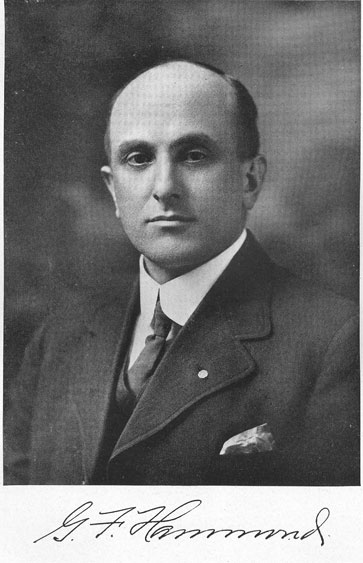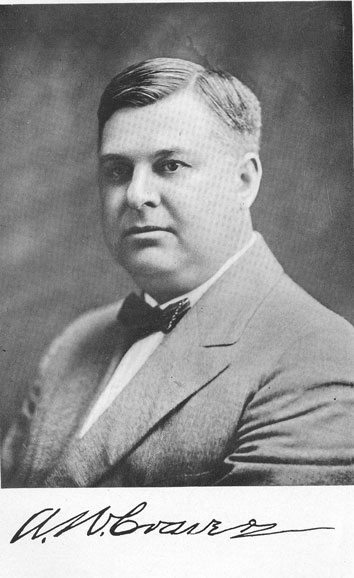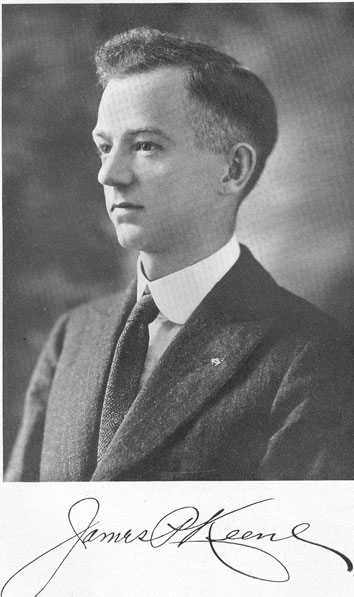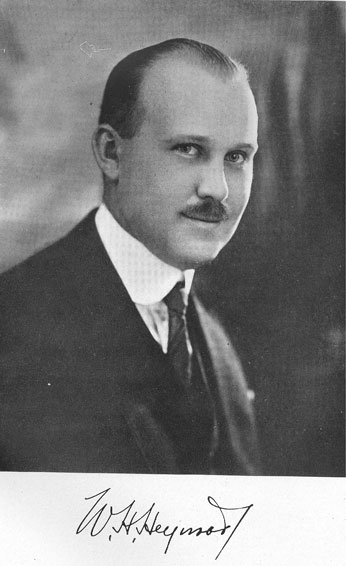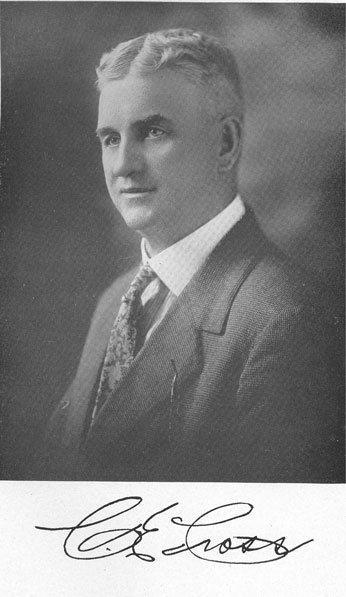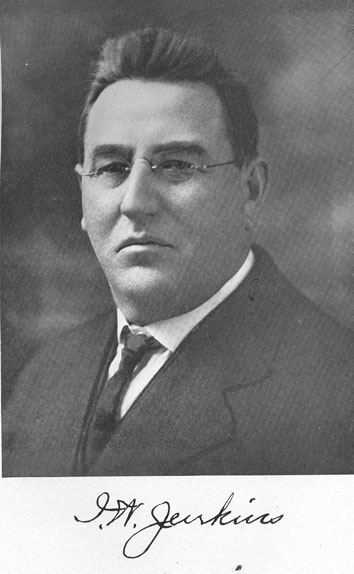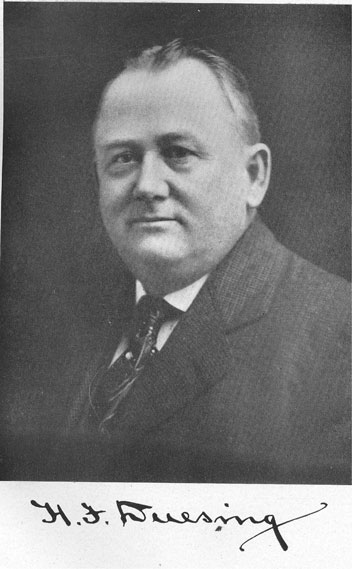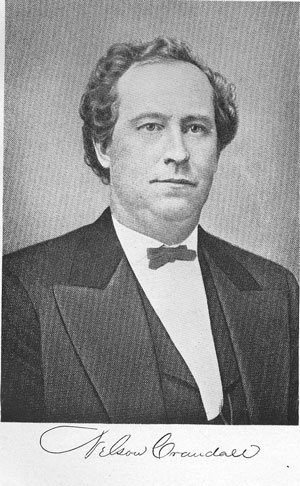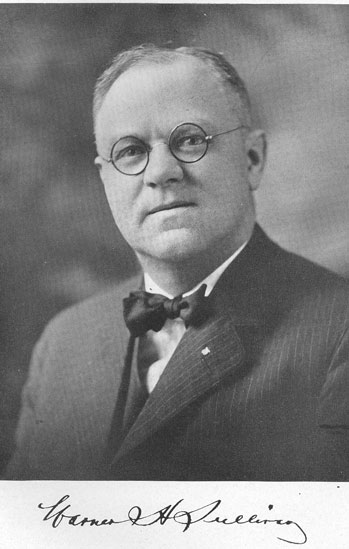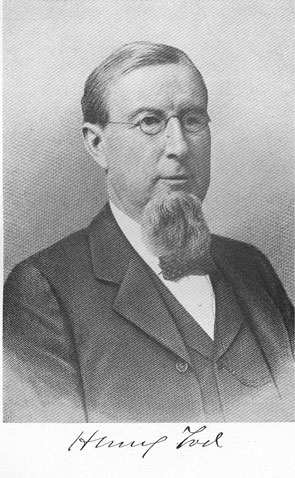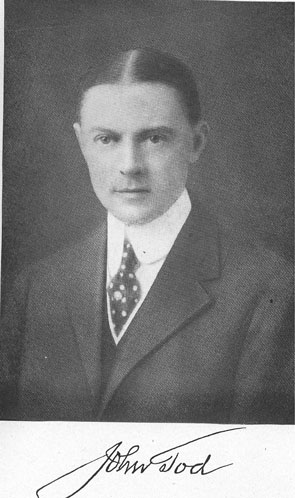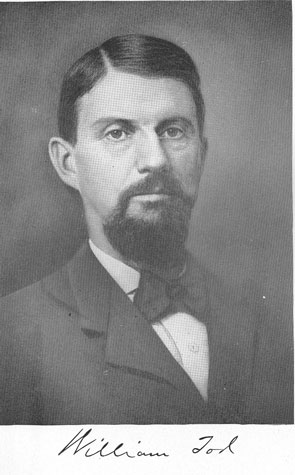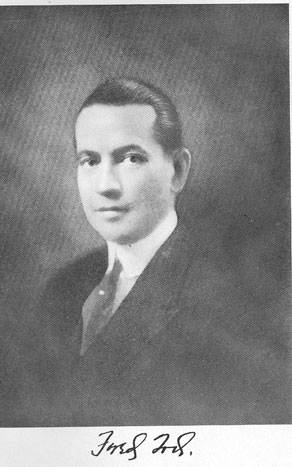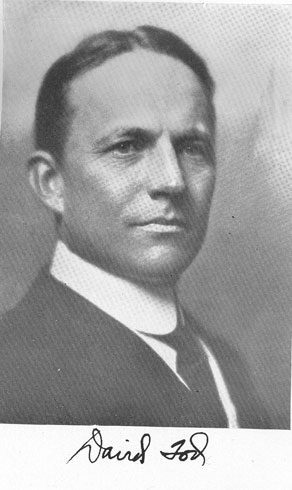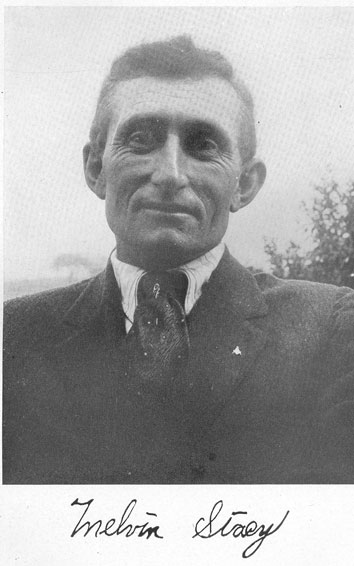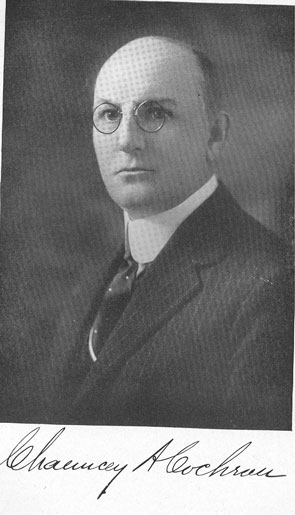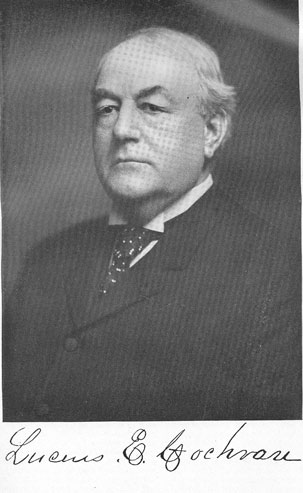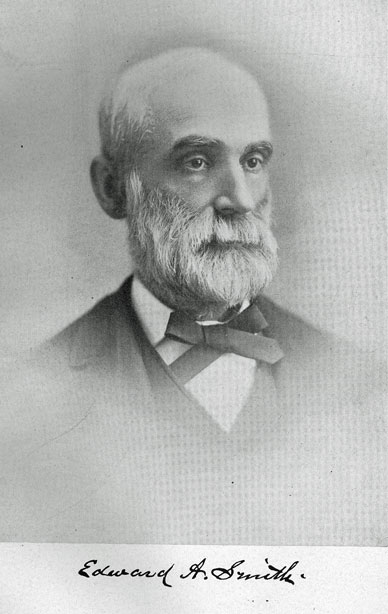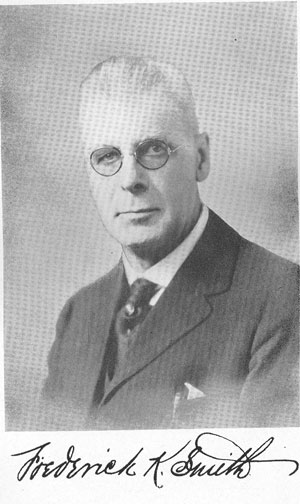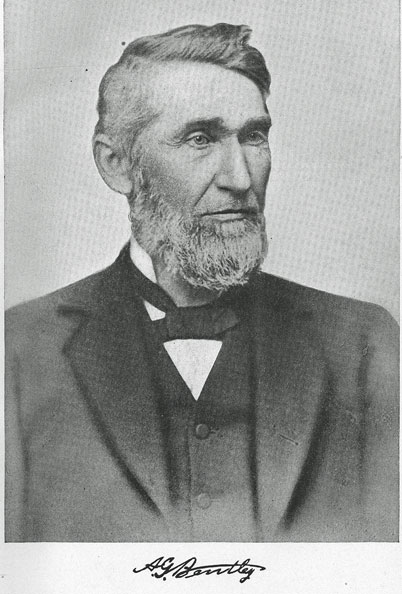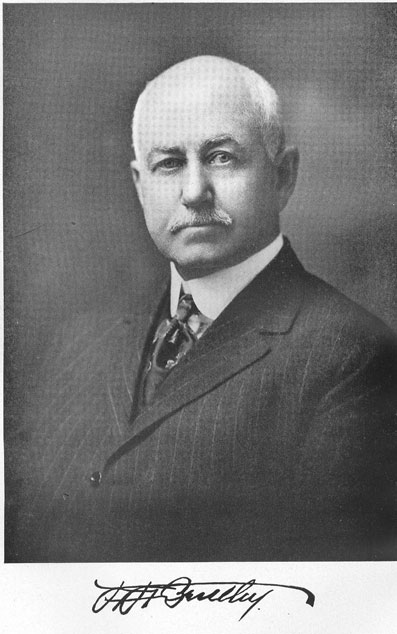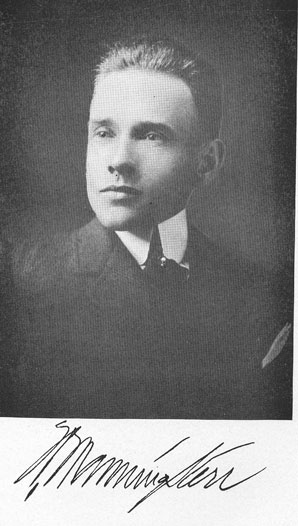F. K. SMITH, M. D. The late Edward Augustus Smith was at the time of his death Warren's
oldest merchant. It is probable that he was Ohio's oldest pharmacist.
The American ancestor of this branch of the Smith family was Richard Smith, who came from
Lancastershire, England, settling first in Massachusetts colony and removing in 1639 to Long
Island, New York, where he purchased land in Suffolk County, and there founded Smithtown.
John C. Smith, father of Edward A. and a direct descendent from Richard, was born September
24, 1798, in New York City. He died there July 23, 1859. He was an early merchant and
postmaster at Jamaica, Long Island, and he later served two terms as county clerk of Queens
County, New York.
John S. Smith married Lucy Ann Hoyt, who was born at Danbury, Connecticut, October 16,
1805, and died the same month and day in 1872, her sixty-seventh birthday anniversary. She was
the daughter of Lewis Hoyt, who was born at Danbury in 1782, a son of Asa Hoyt, who in turn
was descended from Simon Hoyt, the American ancestor who came over from Somersetshire,
England, to Salem, Massachusetts, in 1629, and settled at Windsor, Connecticut, in 184o,
afterward settling permanently in Fairfield County, Connecticut.
Lewis Hoyt married on Sunday, September 23, 1804, Abigail Mygatt, who was born in 1785 in
Connecticut. She was a daughter of Comfort Starr Mygatt, who brought his family from
Connecticut to Canfield, Trumbull County (later the first county seat of Mahoning County), in
1808. With the Mygatts came Lewis Hoyt and his family.
Edward Augustus Smith was born at Jamaica, Long Island, July 21, 1827, and he died April 1,
1919, at Warren. When he was a boy seventeen years old he went to New York City to clerk in a
dry goods store. In 1846 he came to Warren to take a position as clerk in the store of his uncles,
the Hoyt Brothers, general merchants. He soon became manager of the drug department of that
store, which had become more or less independent of the general store operated by the company.
Eventually the firm became Hoyt, Smith & Company, later E. A. Smith & Company, and January
1, 1860, it became Smith, Stratton & Company.
In April, 1860, the store of Smith, Stratton & Company was destroyed in Warren's historic fire,
and Mr. Smith moved into a rented store room on East Market Street, where he continued
business until the construction of his own brick business block on East Market Street, erected on
a lot which he had purchased in 1866. From that time until his death he conducted a drug
business there. For many years he was a director in the First National Bank of Warren, now the
Union Savings and Trust Company. He had many other business interests both at home and
abroad, and he was always prominent in the affairs of the community.
Soon after coming to Warren Mr. Smith identified himself with Christ Episcopal Church, and for
many years he was its oldest living member. He was an early vestryman, and in 1875 he was
elected senior warden, a position he held the remainder of his days. His family recently presented
Christ Episcopal Church with a fine pipe organ as a memorial of him. For many years Mr. Smith
was a member of Warren Independent Order of Odd Fellows Lodge.
A newspaper clipping relates: "Mr. Smith never aspired to public office, and he never held a
position of trust in the community, although he was at all times interested in those things which
served to build up the community and community ideals. He was privileged to see Warren grow
from a hamlet of 2,000 people to a city of 30,000, and he has seen one generation after another
take its place in the business community. The men who were actively engaged in the business
walks of life have been succeeded by their sons and grandsons in his time.
"Mr. Smith's long years of life have indeed been a rich heritage. Ever regular in his habits,
industrious, ever watchful of the little things which tend to nourish the body, are perhaps factors
which have enabled Mr. Smith to enjoy so many years of usefulness. His daily attention to his
business affairs has been a matter of considerable importance. It has been only in recent weeks
that he has not daily visited his store.
"When the Civil war broke out Mr. Smith was just engaging in business for himself, and
permitting his clerks to enter the service he himself remained here to provide for his family and
to assist in aiding the cause of the North in other ways than carrying a musket. The story is told
of how when John Morgan was conducting his raid through Ohio, Mr. Smith hurried home to
secure his shotgun, and joined the band of patriotic citizens who had gathered on the square to go
out and meet Morgan if he came this way. The little band of citizens had not progressed far,
however, before word was received that Morgan had been captured at Lisbon."
On May 5, 1857, Mr. Smith united in marriage with Laura G. Furman. She was born November
4, 1831, at Woodville, South Carolina. She was a daughter of Wood and Laura M. (Lyon)
Furman. Wood Furman was born June 12, 1779, in South Carolina. e was a son of the Rev.
Richard Furman, a native of Esopus, New York, and was descended from Josiah Furman, an
early settler of Long Island, who in turn was descended from John Furman, the American
ancestor of the family who came over from England and settled permanently on Long Island.
Rev. Richard Furman was for many years pastor of the First Baptist Church of Charleston, South
Carolina, and he was for a long time president of the National Baptist Convention. Laura Lyon
was the daughter of James and the granddaughter of Mathew Lyon, who settled in Vermont prior
to the Revolutionary war.
Mathew Lyon was an early publicist, and he was the first man arrested and convicted under the
Alien and Sedition Act of Congress, his offense having been a published criticism of the
Government. While serving his thirty days' imprisonment he was elected to Congress. After
completing his term in Congress he and his son James removed to Tennessee, from which state
he was again elected a member of Con-
YOUNGSTOWN AND THE MAHONING VALLEY - 227
gress. After completing his term as a member from Tennessee Mr. Lyon was appointed Indian
agent for Indian Territory. He was there elected a territorial delegate to Congress, but he died
before taking his seat. He was probably the only man in the history of the United States to be
elected a member Of Congress from three different states.
James Lyon, son of Mathew, married Phila, daughter of Richard Risley and resided in
Washington City while his father was serving in Congress. One of Richard Risley's three
daughters married Judge Pease of Warren, and it was while visiting her Warren relatives that
Mrs. Smith met her future husband. She survives. The children born to Mr. and Mrs. Smith are as
follows : Dr. Frederick K., of Warren ; Edward S., of Warren; Mrs, James Brown, of Warren ;
Mary A., of Warren; Cornelia G., of Warren. The last mentioned was for many years secretary
and librarian of the Warren Public Library.
Frederick Kinsman Smith, M. D., son of the late Edward A. Smith, was born in Warren, Ohio,
April 4, 1858, the date having fallen on Easter Sunday. He attended the Warren graded and high
schools, and later graduated from Western Reserve College at Hudson, Ohio. He graduated in the
class of 1879 at Western Reserve University, receiving his A. B. degree, and from the University
of Michigan with the class of 1883, when he received the degree of M. D.
Doctor Smith entered upon the practice of medicine in 1883 in the copper region of the Upper
Peninsula of Michigan, remaining there until 1893. He then began practice in Cleveland,
remaining there until 1898, when he began practice in Warren, continuing as an eye specialist
until 1918. He then rementired from active practice. Doctor Smith is past worshipful master of
Old Erie Lodge No. 3, Free and Accepted Masons, is past presiding officer of Mahoning Chapter
No. 66, Royal Arch Masons, a member of Warren Council No. 58, Royal and Select Masons, of
Warren Commandery No. 39, Knights Templar, of Lake Erie Consistory, Scottish Rite
(thirty-second degree), and of Al Koran Temple, Ancient Arabic Order Nobles of the Mystic
Shrine, of Cleveland. e is a director of the Masonic Temple of Warren. e is a vestryman of Christ
Episcopal Church, and a member of the Country Club.
Doctor Smith married Amelia, daughter of James Rosewarne, of Copper City, Michigan. Mrs.
Smith was born in England.
ENSIGN N. BROWN, president of the Mahoning County Bar Association and former president
of the Ohio State Bar Association, has been a Youngstown lawyer forty years. While a native of
the old town of Canfield, he spent his early years in the East, and through his mother's family is
related to some of the earliest as well as the most prominent pioneers of the Mahoning Valley.
Mr. Brown was born at Canfield, December 9, 1854, son of Richard and Thalia Fitch (Newton)
Brown. His grandfather, Capt. John Brown, was an officer in the British Army and participated
in the Battle of Waterloo. He came to the United States about 1840 and lived at Canfield, Ohio,
until his death about 1860.
Richard Brown was also a native of England, where his father for several years was a farmer.
Richard had only a limited education, but gained a great amount of knowledge during his many
years of practical business experience. At the age of fourteen he was apprenticed to a draper and
dry goods merchant, spending seven years in learning the business. He acquired a metropolitan
experience in London and later in Paris, and about 1844 came to the United States. For a time he
gave his services to two of the greatest mercantile houses of New York City, Lord & Taylor and
A. T. Stewart. Subsequently he engaged independently in merchandising in New York, where he
remained until 1877. His health having become impaired, in that year he returned to Canfield,
Ohio, where he had found his wife, and he died at Canfield in 1888, at the age of seventy-one.
Comparatively few people know that one of the founders of the now world-wide institution of the
Young Men's Christian Association at one time lived in Mahoning County. Mr. Brown, while in
London, was associated with George Williams in organizing the first Young Men's Christian
Association in the world in that city. Later Williams was knighted by Queen Victoria. After
coming to the United States Richard Brown and others organized in New York City the first
Young Men's Christian Association in this country and served as its first treasurer.
Thalia Fitch Newton, wife of Richard Brown and mother of the Youngstown lawyer, was a
daughter of Judge Eben Newton. Judge Eben Newton was one ot e really distinguished lawyers,
jurists and public leaders in Ohio during the first half of the nineteenth century. Born in
Connecticut in 1795, he first came to Ohio about 1814, read law at Ravenna, and was admitted to
the bar at Warren in 1823. For twenty years he was a partner of Elisha Whittlesey, long a member
of Congress and at one time Comptroller of the Treasury of the United States. For a short time
Judge Newton was in practice at Cincinnati, with Rutherford B. Hayes, afterward president of the
United States, as partner. He was elected to the State Senate in 184o, resigning to take the office
of president judge of the Third Judicial District. While in that office he had the distinction of
holding the first session of the Common Pleas Court in the newly created Mahoning County in
1846. In 1850 he was elected to Congress, and during the Civil war was again a member of the
State Senate. He was also president of two railroad lines in Northeastern Ohio, was prominent in
agricultural circles, and helped train a number of young men for the law, including the great
Ohioans Ben F. Wade, Joshua R. Giddings and others. Judge Newton married Mary S. Church, a
daughter of Ensign Church.
Ensign N. Brown was reared in New York City, where he was educated in private schools. He
had for his teachers two noted educators, Dr. George P. Quackenbos and Dr. Henry B. Chapin.
Under the latter he was prepared for college, but failing eyesight compelled him to abandon his
college career. For a number of years he was associated with his
228 - YOUNGSTOWN AND THE MAHONING VALLEY
father at New York in the business of importing laces and embroideries.
Mr. Brown returned to Mahoning County in 1878 for the purpose of looking after the property of
Judge Newton, then in advanced years. At the request of Judge Newton he took up the study of
law, finishing his reading with the firm of Van Hyning & Johnston. e was admitted to the bar in
1880, and until his mother's death in 1889 lived at Canfield, though practicing in Youngstown.
His home has been in the latter city since 1889. Of late years Mr. Brown has specialized
somewhat in mechanics' liens and building contracts, though still doing a general practice. He
was elected president of the State Bar Association in 1918, and was chosen president when the
Mahoning County Bar Association was organized in 1919. Mr. Brown is a Royal Arch Mason
and a republican.
September 20, 1876, he married Miss Jeannette Cooper, a daughter of John Cooper, a New York
City merchant. They have two children, Genevieve Newton and Bessie Hunt. The family are
members of the Episcopal Church.
Mr. Brown has long been prominent not only in St. John's parish at Youngstown but in the
diocese. e is present junior warden of the parish, and for twenty-five years has been delegate from
the parish to the Ohio diocese. Since 1910 he has represented the diocese in four general
conventions of the church. For years he has also been a member of the Committee of Canons of
the diocese and a member of the Committee of Canons of the General Church, and for ten years
has been one of the standing committee of the diocese. In the spring of 1920, the former
chancellor having died, Mr. Brown was appointed Chancellor of the Diocese of Ohio and is now
acting as such.
JACOB HYDE EWALT. As a banker and manufacturer Mr. Ewalt has had a dignified and
useful career in Warren for over thirty years, and in that time has impressed his influence and
enterprise upon several well known institutions.
He is a native of the Mahoning Valley and descended from two pioneer families, the Ewalts and
the Leffingwells. The Ewalts settled originally in Howland Township of Trumbull County. The
pioneer was John Ewalt, who took up a tract of Government land in that township about 1805.
His son Jacob was born on the homestead in Howland Township in 1810. and lived eight
decades, dying in 1890. He married in 1835 Lydia Maria Leffingwell, who died
in 1889. Her parents came from Connecticut at an early day and settled in Warren Township. A
collateral connection of the Leffingwells were the Hyde family of Hyde Park, London, England.
lateral connection of the Leffingwells were the Hyde family of Hyde Park, London, England.
Jacob Hyde Ewalt was born at the Ewalt farm in Bazetta Township about four miles from the
City of Warren November 12, 1856. e has always regarded it as his good fortune that his early
life was spent in the country. e attended district school to the age of fifteen, and finished his
education in the city schools of Warren. In 1877 Mr. Ewalt became a clerk in the old drug store
of Col. H. G. Stratton at Warren, and after eight years left Colonel Stratton to become
bookkeeper and shipping clerk for the Winfield Manufacturing Company. He has been one of the
men who have developed that notable Warren industry, and in 1904 was made treasurer of the
company and since 1917 has filled the offices of secretary and treasurer.
As a banker Mr. Ewalt was one of the organizers in 1889 of what is now the Trumbull Savings
and Loan Company. He has served as vice president since 1909 and also as a director. He is a
director in the. Western Reserve Furniture Company, in the Enterprise Electric Company, and the
People's Ice and Cold Storage Company.
For the last twenty-five years Mr. Ewalt has been financial secretary of the Board of Trustees of
the First Methodist Episcopal Church. He is a member of the Warren Board of Trade. Mr. Ewalt
married Florence Taylor, daughter of the late Mathew B. and Adaline (Hapgood) Taylor. Her
father was for many years cashier of the old First National Bank of Warren. Mrs. Ewalt died in
1899, the mother of one son and one daughter. The son, Jacob H., Jr., now secretary of the
Gilder-Augstadt Coal and Supply Company, married May Holloway, of Warren, and they have a
son, Richard Holloway, and a daughter, Jean. Charlotte Taylor Ewalt became the wife of Peter
Webb Elliott, of Warren, and they had a daughter, Florence Ellen. Mr. Elliott died in 1916. On
June 6, 1904, Mr. Ewalt was married to Ella Van Gorder (Ford) McWilliams, of Ashtabula,
Ohio, and to this marriage one daughter has been born, Laura Ford Ewalt.
JOHN G. COOPER. The high traditions for public service which have been created for
Northeastern Ohio as the result of the life and works of Joshua R. Giddings, Benjamin Wade,
James R. Garfield, William McKinley and others elected by the people of this part of the state to
represent them in Washington, have been maintained by John G. Cooper, congressman for the
Nineteenth Ohio District, which is composed of Mahoning, Trumbull and Ashtabula Counties.
John G. Cooper began life with few of the advantages which his illustrious predecessors enjoyed,
but by hard work, clear understanding of the needs and desires of the people and unswerving
courage and determination to stand for what he believed to be right, Congressman Cooper has
earned a nationwide reputation. Mr. Cooper was born in Staffordshire, England, in 1872, and
came to the United States with his parents when only eight years old. The Cooper family settled
in the Mahoning Valley of Ohio at a time when its possibilities as an industrial and
manufacturing district first began to be appreciated.
John Cooper's school days ended when he was thirteen, at which early period of his life he went
to work in the iron mills to help earn the daily bread for the family. A few years later he obtained
a position as locomotive fireman in the employ of the Pennsylvania Railroad. He was promoted
to engineer, in which occupation he was engaged when he became interested in politics. The
young man observed what the republican protective tariff and economic policies did for the
development and prosperity of his home community and became a repub-
YOUNGSTOWN AND THE MAHONING VALLEY - 229
lican. In 1wo he was nominated and elected to represent Mahoning County in the Ohio General
Assembly, and was re-elected by an increased vote in 1912. His service in the State Legislature
was so satisfactory that he was chosen as the republican candidate for Congress in the Nineteenth
District in 1914 and elected easily. Mr. Cooper was re-elected in 1916, 1918 and 1920.
Congressman Cooper is a member of the important committee on interstate and foreign
commerce of the House of Representatives. He was the first locomotive engineer or practical
railroad worker ever elected to Congress, and his views on practical railroad and labor questions
are very highly regarded by his colleagues in Congress. His firm stand in Congress against
radicalism in the labor movement during the period of unrest which followed the war with
Germany attracted wide attention and is believed to have been a strong factor in bringing about a
satisfactory adjustment of labor troubles. Mr. Cooper's home is in Youngstown. He is married
and has five sons.
JOHN JAMES MURRAY. In the many years that he traveled, John James Murray was known
from coast to coast as an actor-manager, and his name has a high rank in the realm of minstrelsy,
vaudeville and comedy. At Warren, where he has had his home for a number of years, Mr.
Murray has also been prominent as a theatrical manager, and his name is also closely linked with
other business and civic interests.
He was born in the City of Chicago April 7, 1867, son of James and Ann (Dempsey) Murray. His
parents were natives of Ireland, and both died when the son was a boy. Since he was eleven years
of age John James Murray has made his own way in the world. While acquiring a limited
education in the parochial schools of Chicago, he sold newspapers on the streets and did other
work. In 1881, at the age of fourteen, he first entered the amusement field, and for thirty-five
years was active and successful in all the different lines of the show business, including the
circus, minstrel, comedy and vaudeville, both as an entertainer and manager. He and his
companies played in all the high class houses of the East and Middle West. In two Mr. Murray
and Frank Mackey organized the firm of Murray & Mackey, and for several years owned and
operated the largest popular priced shows on the road. Their show was a prominent feature at
Warren during the Trumbull County Fair for many years. Mr. Murray leased the Warren Opera
House in 1908 and produced all the high class attractions until 1917, since which time the
operahouse has been devoted exclusively to moving pictures. In this field, largely due to the
influence of Mr. Murray, only the finest film features have been presented to the people of
Warren.
Mr. Murray is one of the most enthusiastic believers in the great future of Warren as an industrial
and home center. He has associated himself with many of its enterprises, being a director in the
People's Savings & Trust Company, a director in the Reserve Realty & Mortgage Company, a
director in the Sunlight Electric Company, and a stockholder in other concerns.
During the war he turned over his personal talents and his resources to patriotic service and was
active in the Liberty Bond, Red Cross and War Chest campaigns, and was chairman of the
Trumbull County Labor Board. He is a charter member and director of the Rotary Club and the
Buckeye Club and has been a member of the Order of Elks for thirty years, holding his
membership in Elmira Lodge No. 62. He is also a member of the Warren Board of Trade.
November 26, 1887, Mr. Murray married Miss Florence Louise Long, a native of Cincinnati and
daughter of Louis and Catherine (Madenbach) Long. Mr. and Mrs. Murray had three children, but
the first two, Robert James and Florence, are deceased. The only living daughter, Margaret
Florence, is now a student of the Ladies of Loretto Convent at Niagara Falls, Canada.
BERNARD MCMANUS. Out of a hard apprenticeship, early contact with work at meagre
wages, and with the ripe experience and broader vision of his later years, Bernard McManus has
come to that higher plane of business affairs where he is head of one of the best mercantile
organizations in Youngstown, the B. McManus Company, known as "Youngstown's Greater
Store for Women."
Mr. McManus was born in County Cavan, Ireland, in 1877, son of Thomas and Mary
(MacManus) McManus. His father, now deceased, was also a native of County Cavan, for many
years was a successful teacher, and he died at the age of eighty-eight on April 22, 1wo. His wife,
Mary MacManus, as the name indicated, was of Scotch ancestry, born in Scotland, and died in
1884.
Bernard McManus, one of six children, attended school at home and was eighteen years of age
when he came to the United States. His first home was in St. Joseph, Missouri. The means of
earning a living for several months was selling the St. Joseph Gazette on the streets of that
western city. At the same time he was diligently pursuing his studies in night school. After six
months as a newsboy he entered the service of the Combe Printing Company of St. Joseph, at
that time one of the largest printing establishments in the Missouri Valley. He continued his work
in night school, and after about a year he and his brother, Thomas H., went to Newton, Kansas,
and with a modest capital opened a stock of general merchandise. They were merchants in
Kansas for fifteen years, and built up a large and flourishing business.
On leaving Kansas Mr. McManus started East, his contemplated destination being New York
City. He stopped to visit at Cleveland, and his visit was turned into a stay of several years, during
which time he had a profitable connection with The H. Black Company. At the same time he was
making a thorough study of commercial conditions, and eventually his judgment led him to
locate at Youngstown.
Mr. McManus came to Youngstown nine years ago and began business as a merchant on East
Federal Street, subsequently moving to West Federal Street, and three years ago into the
five-story building which the B. McManus Company now occupies, each floor devoted to a
special department. Judicious
230 - YOUNGSTOWN AND THE MAHONING VALLEY
women shoppers all over Eastern Ohio know the McManus store. The spirit of the business is
well described in the following words : "To make this exclusively and increasingly a store for
women, where women will come intuitively for every article of ready-to-wear clothing they
desire, is our reason for existence. To make our merchandise so good, so comprehensive, so
satisfactory and to give the kind of courtesy and attention in service to which a woman feels
entitled, is the inspiration we cherish. We call our store 'greater' not because of material bigness,
but because of this all-inclusive idea actuating it, in the development of which we find our daily
pleasure."
Customers also frequently see posted in different parts of the store the following notice :
"Employes Attention : Our reputation with the people of Youngstown is in your hands. See that it
is protected."
Mr. McManus is president of the company and is active manager, and is also the source of
inspiration for the ideals and the spirit of service permeating the business. Mr. McManus is also
vice president of the Moore-Lamb Construction Company. He is an active member of the
Chamber of Commerce, the Poland Country Club, is a Knight of Columbus and with his family
worships in St. Edward's Catholic Church. During the war he was liberal with his time and
means in behalf of the various campaigns, and has been equally public spirited in promoting
everything of benefit to Youngstown.
Just before going into business at Youngstown Mr. McManus married Miss Lena Madden,
daughter of E. J. and Margaret Madden of Youngstown. They have three sons, Bernard, Jr.,
Edward and Thomas.
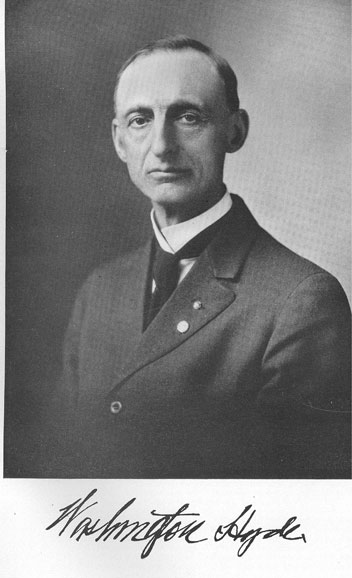
WASHINGTON HYDE, attorney and capitalist, is one of the leading men of Warren and the
Mahoning Valley, and his counsel is sought on many matters of public interest as well as those
connected with his profession. He was born on the farm owned by his parents at Farmington,
Trumbull County, Ohio, May 7, 1847. His father, Julius E. Hyde, was also born on this farm, in
1825, he being a son of Eli Hyde, a native of New York State, of Yankee stock, who came to
East Farmington, Trumbull County, Ohio, about 1818, and was one of the pioneers of that
section of Trumbull County. He married Hannah Porter, a native of New York State, and a
daughter of a Revolutionary war soldier. They were married in New York State at an early age
and came soon afterward to Trumbull County, making the journey in an ox-cart.
The mother of Washington Hyde was Ann Oatley, and she was born in Bazetta Township,
Trumbull County, in 1824, a daughter of William and Sophia Oatley, of Pennsylvania Dutch
stock, her father having been a pioneer of Bazetta Township, he settling on a farm there about
1815.
Julius Hyde was a successful farmer and dairyman and was noted as a cheese maker. He died in
1898, his wife passing away in 1891. Earnest Christian people, they maintained membership in
the Methodist Episcopal Church, and were very active in its good work.
Washington Hyde was reared on the farm, attended the old Western Reserve Seminary at West
Farmington, Ohio, and was graduated from the University of Michigan in 187o, with the degree
of Bachelor of Arts, and from the legal department in 1872, with the degree of Doctor of Laws.
He was a classmate all through college with Judge William R. Day, of the United States Supreme
Court, with whom he was also admitted to the bar in 1872, before the District Court at Ashland,
Ohio.
Entering upon the practice of law at Warren in 1872 Mr. Hyde has continued in it. He served
from 1880 to 1885, inclusive, as prosecuting attorney of Trumbull County, and was for many
years active in republican politics. Mr. Hyde has other interests, having in 1898 been one of the
organizers and incorporators of the Warren & Niles Telephone Company, of which he is
president and treasurer and a director. This is now a $500,000 company, and is the only one now
doing business in Warren in giving a telephone service, having bought out the Bell Telephone
Company. He also organized and incorporated the King Furniture Manufacturing Company of
Warren, of which he is president and treasurer, and he is also president and a director of the
Warren Rubber Company of Warren.
Mr. Hyde was married in 1876 to Laura E. Tibbitts, of an old family, her mother having been a
daughter of a brother of Moses Cleveland, the "father" of the City of Cleveland, Ohio. Mrs. Hyde
died in 189o, leaving the following children : Jessie A., George C. and Charles W. In 1893 Mr.
Hyde was married to Victoria Pinkard, who was born in Warren, and to them have been born the
following children : Edward L., who is now a law student at the Ohio Northern University, is a
veteran of the great war, having spent nine months in France with the One Hundred and Eighth
Ammunition Train, American Expeditionary Forces ; Lillian 0., who is at home; and Clarence A.,
who was with the American Expeditionary Forces in France, was killed in active service in the
Argonne drive just before the signing of the Armistice. He was a member of Company D, One
Hundred and Forty-Fifth Regiment.
Mr. Hyde is a member of Old Erie Lodge No. 3, Free and Accepted Masons, and Warren
Commandery No. 39, Knights Templar. The Warren Board of Trade holds his membership, and
he is active in its operations. Professionally he belongs to the Trumbull County Bar Association
and for five years was a member of its bar committee. For some years Mr. Hyde has been a
member of the Youngstown Unitarian Church. A man of the highest standing in both
professional and business circles, Mr. Hyde is admittedly one of the representative men of this
section of the state, and a citizen who reflects honor and dignity upon his community and calling.
FRANK C. VAN WYE., who is carrying forward successful operations on the John Anderson
farm in Weathersfield Township, Trumbull County, one mile west of the City of Niles, is a native
of this township and a representative of a family whose name has been worthily linked with the
history of Trumbull County for nearly a century. e was born on
YOUNGSTOWN AND THE MAHONING VALLEY - 231
the old pioneer homestead farm of his grandfather, Abram Van Wye, in Weathersfield Township
December 2, 1849, and is a son of John and Adaline (Carlton) Van Wye, the former having been
born in Pennsylvania and the latter having been a daughter of Peter Carlton, a pioneer settler at
Girard, this county. Abram and Charity (Laird) Van Wye, grandparents of Frank C., were born
and reared in Washington County, Pennsylvania, where their marriage was solemnized and
where seven of their children were born, the Van Wye family, of Holland Dutch origin, having
been founded in the Keystone state prior to the war of the Revolution, and the lineage of the
Laird family tracing back to Scotch origin. In 1834 Abram Van Wye came with his family to
Trumbull County and located in the midst of the forest in Weathersfield Township, where he
obtained a goodly tract of land and reclaimed a productive farm along the Mahoning River. He
died in his fifty-eighth year, and his wife passed away at the age of sixty years. Their children
were Charles, John, Lydia (Mrs. Hiram Dunlap), Mary Jane (Mrs. John A. Hunter), Nancy (Mrs.
Theodore DeForest), Catherine (died in childhood), Amanda (likewise died in childhood),
William (killed at Ringgold, Georgia, while serving in the Civil war), Joseph W. (individually
mentioned on other pages, where also is found further record concerning the family history),
Darthula (Mrs. Charles P. Moore, of Bristolville, Trumbull County), Elmira (died at the age of
twenty-two years) ; and Sabina (Mrs. Thomas Radcliffe, died at Warren, in 1919).
John Van Wye, after the death of his father, continued to be associated with his brothers in the
management of the old home farm until 1863, when he sold his interest in that place and
removed to Howland Township, where he purchased a farm that is now occupied by the
Trumbull Steel Company and the Brier Hill Steel Company. There he owned more than 200
acres, the land extending to the Mahoning River. Not only the old canal, but also the first railroad
in the county traversed this farm, and eventually Mr. Van Wye sold the right-of-way for five
different lines of railroad which crossed his property. When the final sale of his old farm was
made to the Trumbull Steel Company the tract still comprised about 200 acres. Here John Van
Wye died at the venerable age of eighty-six years, his wife having passed away at the age of
seventy years, their names meriting place on the roster of the honored pioneers of the county. Of
their children the subject of this review is the eldest ; Mary is the wife of Reuben Templeton, of
Braceville, this county; Lois is the widow of William S. Campbell and resides at Cambridge,
Guernsey County, her husband having been a son of Rev. William Campbell, a pioneer
Presbyterian clergyman ; Florence died in childhood; Olive is the wife of William Bolin, of
Warren; Homer W. died in August, 1919, aged sixty years, he having been engaged in the livery
business at Warren; John E., who was long in service as a railroad engineer on the Pennsylvania
Lines, was a resident of Niles at the time of his death, in March, 1916; Gerry P., a patent
attorney, is engaged in the practice of his profession in New York City; Benjamin C., a graduate
of Harvard University, is now a member of the faculty of a college in the City of Cincinnati, he
having previously been a teacher in the City of Boston, where his marriage occurred; and Lucy is
the wife of William Brown, station agent for the New York Central Railroad at Hubbard,
Trumbull County.
Frank C. Van Wye gained his early education in the common schools and remained at the
parental home until he was twenty-four years old, when he married and established his home on
the Isaac Troxell farm, which property he purchased and which adjoined his father's farm. He had
ninety- three acres, but the area of the place was somewhat reduced when he sold a railroad
right-of-way through the farm. He added to the original farm until he had 103 acres, and in 1916
he sold the entire property to the Briar Hill Steel Company as a site for its manufacturing plant.
For eight years Mr. Van Wye served as a member of the Board of Directors of the County
Infirmary, and he also gave effective service as trustee of his school district, his political
allegiance being rendered to the republican party. After selling his old farm Mr. Van Wye finally
purchased his present well improved place of forty-one acres, which extends across the former
bed of the Mahoning River, the four-mile locks on the old canal having been on this farm, which
was held for generations by the Anderson family. Of this property Mr. Van Wye sold
twenty-seven acres to the Falcon Steel Company, whose mill has been erected here. Mr. Van
Wye is living virtually retired, but takes satisfaction in giving a general supervision to the work
of his attractive little farm, his entire life having been marked by close association with
agricultural enterprise in his native county, where his circle of friends is coincident with that of
his acquaintances. e was reared in the faith of the Methodist Episcopal Church and has been
liberal in support of religious work. He is affiliated with the Masonic fraternity.
September 10, 1874, recorded the marriage of Mr. Van Wye to Miss Celestia A. Pearce, daughter
of Newcomb and Mary (McConnell) Pearce, she haring been born on the old homestead of her
maternal grandfather in North Jackson Township. To Mr. and Mrs. Van Wye have been born four
children : Thaddeus I. and Mabel remain at the parental home; Mary is the widow of Charles
Lodwick and resides at Niles; and Frank, a lawyer and civil engineer, is in the employ of the City
of Cleveland in a professional way. After his graduation from the high school he completed a
course in the law department of the University of Michigan and was admitted to the bar, he
having been, as a civil engineer, employed for some time in government work with the
Mississippi commission. December 2, 1919, on the seventieth anniversary of his father's birth,
Frank Van Wye was united in marriage to Miss Jean Mahaffey, of St. Louis, Missouri.
ROBERT L. MCCORKLE since leaving school and takrng t e responsibilities of life has given
all his time and energies to financial institutions in Niles, and has been actively identified with
the Niles Trust Company since it was organized.
Mr. McCorkle was born at Lordstown in Trumbull
232 - YOUNGSTOWN AND THE MAHONING VALLEY
County June 8, 1878, son of Almon G. and Martha (Leitch) McCorkle. Family sketch appears
elsewhere. His mother was a native of Ireland. The McCorkle family is an old and honored one
in Trumbull County. It is of Scotch-Irish ancestry. When the Mahoning Valley was a wilderness
Robert L. McCorkle, great-grandfather of the Niles banker, ame here and employed his energies
in developing a homestead. The family occupation as a rule has been farming. Almon G.
McCorkle is still living at Lordstown, and all his five children are alive.
Robert L. McCorkle grew up in his native village, attended the public schools, the Warren High
School, and at the age of nineteen became a messenger in the old City National Bank at Niles.
Later he was made bookkeeper and teller. When that bank was consolidated with the First
National he continued as teller in the new organization, and later assisted C. P. Wilson in
winding up the affairs of the First National Bank.
The Niles Trust Company was organized in 1909, and since it opened its doors Mr. McCorkle
has been treasurer. He has a number of other business interests at Niles. He is a republican in
politics, is a Royal Arch Mason and a member of the Niles Club. May 1, 1902, he married Miss
Anna Eaton, daughter of John W. Eaton. They have one son, John Almon,
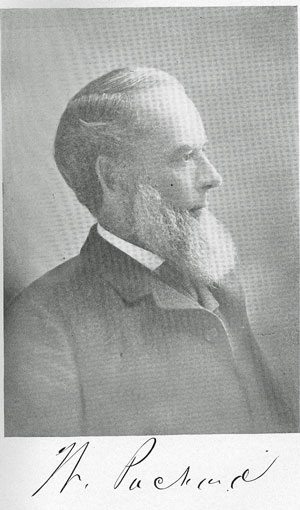
THE PACKARD FAMILY of Warren has for three-quarters of a century been intimately
associated with the history of the City of Warren and of the Mahoning Valley. A Packard was a
pioneer in the settlement of the valley; a Packard was a pioneer in the commerce of Warren; and
two Packards are pioneers of industry of this city.
The pioneer settler was William Packard, who was a native of Pennsylvania, born in Washington
County, that state, on September 3, 1803. He settled at Austintown (then in Trumbull County), in
1825. Late in life he removed to Kern County, California, and died at Kernville on December 11,
1877, after having served for several years as judge of Kern County. The pioneer in the
commercial history of Warren was the late Warren Packard, son of William. e was born at
Austinburg (then Trumbull County) on June T, 1828, and died at Warren on July 28, 1897. The
pioneers of industry of Warren are William D. and James W. Packard.
Warren Packard was without doubt one of the towering figures in the earlier history of Warren.
While the Mexican war was still in progress he left the old farm at Lordstown, an ambrtious and
energetic lad of eighteen years, to seek his fortune at the county seat of old Trumbull. All of his
earthly possessions were literally contained in the proverbial cotton handkerchief as he trudged
his way into town. Through the influence of his brother-in-law, the late Eli K. Weisell, he
obtained a situation with Milton Graham, then operating the pioneer iron store of this section.
For the first year after coming to Warren he attended school during the greater portion of his
time, paying his board by doing chores nights and mornings, and on Saturdays driving Mr.
Graham's team to Niles and Youngstown and buying for the store iron and nails in such
quantities as would about cover the sales for the ensuing week. Those were the days of small
things, as compared with the magnitude of present operations His duties included taking care of
the team, one or two cows, sawing stove wood for the house and shop, and at the noon hour
"tending store" while the boys went to dinner. His was a long day, lasting from 5 A. M. until 9 P.
M., but that tireless, restless boy maintained the same hours from 1846 until 1897. The second
year with Mr. Graham, young Packard received $too, his board included, and upon that amount
he could give but slight attention to dress, the boys and society in general ; but that troubled him
but little. Five years later Mr. Packard was the sole owner of the original Graham store, and also
the hardware store started a year or two later in opposition to the Graham store by Charles
Reuben Harmon. The store of Thomas H. Morely was likewise taken in by the far-reaching
enterprise of Mr. Packard. Thus, in 1863, Mr. Packard found himself the owner and successful
manager of the largest iron and hardware business operating between Cleveland and Pittsburgh.
He pushed trade with phenomenal vigor and also marketed the bulk of the products of the Spear
Planing Mill and the Packard, Hull & Company, of which he was principal owner.
In addition to the above industries Warren Packard purchased extensive timber tracts in
Pennsylvania and in some of the southern states, and actively engaged in the manufacture of
lumber, establishing numberless modern sawmills on his various properties. Enormous quantities
of his products were used in the building of the old Atlantic and Great Western Railroad (now
the great Erie system), and in later years millions of feet of his lumber products were consumed
in- the operation of that now famous trunk-line. Mr. Packard also had invested $100,000 in the
old Packard & Barnum Steam Forge & Rolling Mills at Warren, and it was while he was the
executive head of that concern that he was one day summoned to New York City by Jay Gould,
the then presiding genius of the Erie Railway. At their meeting in Mr. Gould's office the "Wizard
of Wall Street" informed Mr. Packard that he desired a half interest in the Packard & Barnum
Steam Forge & Rolling Mills and, in return for the same he agreed that all of the scrap-iron of the
Erie Railway would be exclusively sold to Mr. Packard's company, and said to Mr. Packard,
"You can weigh the scrap yourself." The proposition was attractive and would no doubt have
been a very profitable one, but it did not appeal to Mr. Packard, and the deal was never
consummated. Mr. Packard's embarkation into the manufacture of iron was not made at a
propitious time, as many of the iron mills were at that time being operated at a loss, and as a
result of those conditions he lost practically the full amount of the $200,000 which he invested.
During the same decade he supplied the sum of $100,000 with which the firm of W. & A. J.
Packard built and stocked the "Hardware Block" at Youngstown. This business was successfully
operated until the approach of the panic of 1873 brought a rapidly declining market for all metal
goods, and that, together with a disastrous fire, caused a large financial loss to Mr. Packard.
About 1865 Mr. Packard became the largest owner in the Austin Flagstone Company, which
investment yielded
YOUNGSTOWN AND THE MAHONING VALLEY - 233
him handsome returns. During Mr, Packard's busy career he accumulated more than one fortune,
for with but few exceptions all of the enterprises to .which he gave his personal attention were
successful; but through indorsements made for his associates he sustained losses that would have
overshadowed to the grave less strong men ; nor did he follow the example of many other leading
men of the Mahoning Valley who, having met with reverses during the panicky days immediately
preceding and following the year 1873, sought relief through the bankruptcy courts; he merely
bent his energies to recuperation and to the achievement of even greater results, and again
succeeded through his own efforts, settling in full all of his obligations.
In 1867 Mr. Packard made a tour of Europe with his brother John, and while in England laid a
broad foundation for importing hardware direct, which branch of his business he continued with
increasing profit and volume until tariff laws turned the trade to our own shores. In 1874 Mr.
Packard, three brothers and others spent the winter on the Pacific coast, and while the trip was
intended for recreation purposes, Mr. Packard's commercial instinct led him to improve the
opportunity and secure valuable trade connections. During the last twenty years of his splendid
activity Mr. Packard thoroughly enjoyed his vacations at Chautauqua Lake, where he built the
first cottage at Lakewood, New York, now dotted with 300 summer homes. With associates he
purchased the farm upon which this delightful little village is located, and he never ceased to
boom the region.
In September, 1852, Mr. Packard was married to Sylvia Camp, a daughter of the late Alanson
Camp, of Warren. They had two sons born to them, namely: Harry, who died at the age of ten
months, and Rollo, who died at the age of two years. His wife passed away in December, 1856,
aged twenty-three years. In November, 1860, Mr. Packard was married to Mary E. Doud, and
they became the parents of five children. She was born in Mendham, Morris County, New Jersey,
and died at Warren on November 2, 1896.
Warren Packard was a man of broad vision and optimistic views, and through these
characteristics he was able to carry out to magnificent completion plans others would not dare
undertake. He was one who never learned that the word failure had a place in the language.
When he met with reverses he faced them boldly and ofttimes turned them into success simply
through his own grit and determination to "make good." The example he set and the influence he
exerted are still reflected in the lives and works of not only his own sons, but those of other men
who have taken up the responsibilities of the industrial and commercial life of the Mahoning
Valley. To know Mr. Packard and have the privilege of associating with him was to receive a
mental tonic and bracing inspiration, and there was probably no man in the Mahoning Valley
who was held in higher esteem by his fellow citizens than the late Warren Packard, one of the
most efficient and public-spirited business men this region has ever produced.
WILLIAM DOUD PACKARD, son of Warren and Mary E. (Doud) Packard, was born at
Warren on November 3, 1861, and has practically spent his entire life in this city. He was
educated in the public schools and at Ohio State University.
Early in life Mr. Packard gave evidence of having, to a marked degree, inherited his father's
business genius. As a boy he and his brother James W. sold papers and established and operated
a small printing office in their home, and with earnings thus accumulated paid the expenses of a
visit to the Centennial Exposition at Philadelphia in 1876. He also learned telegraphy in his
youth, and in later days was given an opportunity to make practical use of that knowledge.
Immediately after leaving college Mr. Packard took a position as bookkeeper and salesman in his
father's hardware store, and when the latter became agent at Warren for the American Union
Telegraph Company and the U. S. Express Company, young Packard became express clerk and
telegraph operator. Later he was telegraph operator and conducted a news stand at his father's
hotel at Lakewood, Chautauqua Lake, New York. He still later was identified with his father in
the planing-mill at Warren as junior member of the firm of W. Packard & Son.
Upon the organization of the Packard Electric Company at Warren in woo Mr. Packard .became
an executive of that concern, continuing with the company during that period while the Packard
automobile was in course of development ; and as manager of the sales department of the
Packard Motor Car Company he developed that part of the organization to an unusual degree.
Upon the sale of the company to Detroit interests, and the removal of the company to that city,
Mr. Packard retired from participation in all business affairs.
In 1911 he promulgated his plans by the purchase of a tract of fifty-five acres, of land on
Mahoning Avenue and lying along the beautiful Mahoning River. This land he presented to the
city to be used only for park purposes upon the condition that the city would undertake its
development and perpetual up-keep. This latter arrangement was consummated by Mr. Packard
only by the exercise of patience, perseverance and tact. The taxpayers desired Packard Park, but
were loath to accept taxation for its development and up-keep, and in bringing his project to
fruition Mr. Packard accomplished an undertaking second only in vital importance to the
establishment of the park—an undertaking which was absolutely necessary for the establishment
and maintenance of the park for the coming generations of Warren people. When the work of
laying out and development of the park began Mr. Packard took charge as engineer, donating his
services, and for the next three or four years he was fully and happily occupied with his work.
Not being a voting citizen of Warren, Mr. Packard does not hold a place on the board of park
trustees, at the same time, however, he has always, and does now, dominate the actions of the
board with the full consent of all concerned.
Packard Park is the principal "show-spot" of the city and is of inestimable value to Warren,
giving it
234 - YOUNGSTOWN AND THE MAHONING VALLEY
a delightful recreation spot along one of the attractive water courses of the valley. In donating the
park and assisting in preparing it for public use Mr. Packard has reared a monument to himself
and his family of greater actual value than the mightiest granite column ever set up to
commemorate a person or an event. Not only is this park enjoyed by those now living, but it will
be handed down as a priceless heritage to generations to come, who as they enjoy its many sylvan
beauties will have cause to remember the founder and be grateful for his unselfish benevolence.
JAMES WARD PACKARD, son of Warren and Mary E. (Doud)) Packard, was born at Warren
on November 5, 1863, and was educated in the public schools and at Lehigh University and
graduated with the degree of Mechanical Engineer with the class of '84.
Mr. Packard's mechanical and inventive genius, together with his capacity for close application to
the object in hand, have won him national recognition as an engineer, while his work as a pioneer
in the development of the automobile has gained him a world-wide fame.
After leaving college, in the summer of 1884, Mr. Packard entered the shops of the Sawyer-Mann
Electric Company at New York as a "dollar-a-day" man. Subsequently he was made assistant
superintendent of the plant, and so continued for a number of years. Then, in 1890, after having
gained a practical knowledge of the electrical industry, Mr. Packard returned to Warren and
engaged in the manufacture of incandescent lamps under the firm name of the Packard Electric
Company, which concern was not only the pioneer in that line in that city, but was the direct
cause for Warren becoming the center for the manufacture of electric lamps. This pioneer
company was but a modest affair at its inception, for capital was scarce and local interest and
support were limited. In fact, had Mr. Packard not been able to interest outside capital it is
doubtful if the young company would have been able to progress very far and certainly its
progress would not have been rapid, and Warren might have been deprived of one of its largest
and most beneficial industries of the present day. So the successful establishment of the Packard
Electric Company was really the beginning of the transformation of the City of Warren with its
then population of 5,000 into the industrial center of today, with a population of 30,000.
Mr. Packard was the president, general manager and guiding genius of the Packard Electric
Company, and to him was due its success, for it was he who supplied the inventive genius and
mechanical skill and enlisted the financial support which made possible its success. The Packard
Electric Company later sold its business to the General Electric Company, but retained its
corporate name and a part of its plant. Subsequently both the name and business were sold.
Mr. Packard has always worked along the lines of both invention and the development and
application of methods of inventions already on the market. e early became interested in
gasoline-driven vehicles, and before any of them were on the market he had made drawings
along those lines. Later he purchased one of the first American made "horseless carriages" to
come on the market, and his genius recognizing the great possibilities in its crude motor, he
began experimenting along the lines of invention and development, and produced a finished
automobile which ultimately became the "Packard" car of today.
Upon the organization of the Packard Motor Car Company, Mr. Packard became its president
and general manager. A time came in the history of the company, however, when to assure
needed expansion outside capital must be secured, and Mr. Packard induced a number of
capitalists of Detroit to become interested. This resulted, in 1902, in the removal of the plant to
Detroit, Mr. Packard continuing as president. Later he was made chairman of the board of
directors of the company, a position he.held until April, 1915, when, desiring to retire from all
active business affairs, he resigned, but retains his financial interest in the corporation.
Mr. Packard has maintained his summer home at Lakewood, Chautauqua Lake, New York,
where he recently built a fine country residence, but still has his winter home at Warren. He
belongs to the Engineers' Club of New York City, the Union Club of Cleveland, the Detroit Club
of Detroit, and in point of membership is one of the oldest members of the Automobile Club of
America, of New York City.
Mr. Packard was united in marriage with Elizabeth A. Gillmer, a daughter of Judge Thomas I.
Gillmer of Warren. Mrs. Packard is a graduate of Vassar College.
GERARD C. CHIRICHIGNO. Identified with one of the leading industries of Mahoning
County, Gerard C. Chirichigno, of Youngstown, has met with pronounced success in his career,
and as general manager of the Youngstown Wire & Iron Company is a prominent factor in
advancing the manufacturing interests not only of the firm by which he is employed but of the
city and county. A son of Anthony and Louisa Chirichigno, he was born in 1890 in Italy. His
parents came with their family to the United States many years ago, locating first in Pittsburg,
1896, but later settling in Youngstown, where the father engaged in the baking business on South
Watt Street for upwards of twenty years.
A good student, anxious to learn, Gerard C. Chirichigno attended school regularly during his
boyhood days, and later worked throughout his vacations in various structural iron plants. After
his graduation from the Rayen High School, with the money thus earned Mr. Chirichigno entered
the mechanical engineering department of the University of Pittsburg, from which he was
graduated with the class of 1915, after which he was employed in the engineering department of
the Carnegie Steel Plant and in the Petroleum Iron Works at Sharon, Pennsylvania, and later
accepting a position with the Youngstown Wire & Iron Company he was sales manager for three
years.
In 1919, when the company was reorganized, Mr. Chirichigno became a stockholder and the
general manager, a position of great responsibility, which he is filling to the entire satisfaction of
the firm and to its large patronage. The company, which makes a
YOUNGSTOWN AND THE MAHONING VALLEY - 235
specialty of structural and ornamental iron works, has recently moved to more commodious
quarters, being very advantageously located in the old Sennett plant at Sycamore & Andrews
Avenue. Mr. Chirichigno's brother Michael, a graduate also of the Rayen High School, returned
to Youngstown in the summer of 1919 from France, where he was in service during a part of the
World war.
Mr. Chirichigno married June 3o, 1919, Miss Angelina Parillo, of Girard, Ohio.
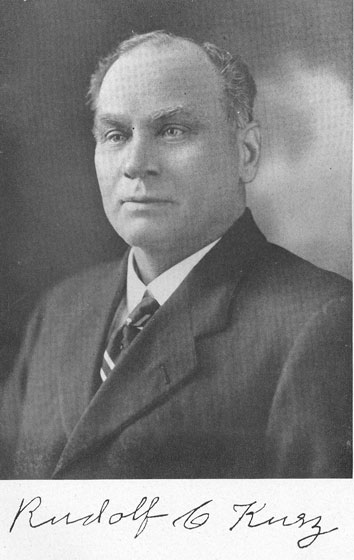
RUDOLF C. KURZ. Practical industry, wisely and vigorously applied, never fails of success. It
carries a man onward and upward, brings out hrs individual character and acts as a powerful
stimulus to the efforts of others. The greatest results in life are often attained by simple means
and the exercise of the ordinary qualities of common sense and perseverance. The everyday life
with its cares, necessities and duties, affords ample opportunities for acquiring experience of the
best kind, and its most beaten paths provide a true worker with abundant scope for effort and
progress. The record of Mr. Kurz is that of a man who by his own unaided efforts worked his
way from a modest beginning to a place of affluence and influence in the business world, and
today he enjoys the unbounded confidence of his fellow citizens of Youngstown.
Rudolf C. Kurz was born in Prussia on February 26, 1855, the son of August and Caroline
(Stark) Kurz. August Kurz was a professional soldier and was a member of the Household Guard
of Emperor William I of Germany. Eventually he sold his holdings in Germany and brought his
family to the United States in 1866. He at once came to Youngstown and entered the employ of
Parish & Nash, cabinetmakers. He afterwards worked in George Dingledy's mill and lumber yard,
which were located on Basin Street; still later he worked for Lindsay & Boardman. With the
money he brought from Germany he bought a comfortable home, where he lived until his death,
which occurred in 1877, at the age of sixty-nine years. His widow died in 1879, when sixty-eight
years of age. They were members of the Lutheran Church and were held in high esteem by those
who knew them. They were the parents of twelve children, of whom those living are Rudolf C.,
and Pauline, of this city, the widow of William Hulzwhart.
Rudolf C. Kurz attended school in Germany, completing his common school studies in the old
Woods Street school in this city, doing chores at the time and attending C. H. Andrews' horse.
His first employment after he left school was in the old Brown-Bonnell mill, when eleven years
old, packing nails, under Ned Jones ; beating nail plates, under Dick Ferguson; on rolls, under
Dan Reibel, while among his other bosses were Frank Brown, Jack McDonald, Sam Fellows and
Leonard Black, all of whom were well known among the iron men of that day. After four years in
the iron mill Mr. Kurz applied himself to learn the blacksmith and wagonmaking trade with
Siegfried & Lemley, their shop standing on the present site of Deibel's butcher shop on Federal
Street. After completing his apprenticeship he with his brothers Ernest and Albert opened the
shop now owned and operated by the subject and under the firm name E. Kurz and Brothers, and
soon did a large and prosperous business. They also operated a harness and saddlery business on
Phelps Street, where the Equity Saving & Loan Company is now located. Mr. Kurz was wisely
economical and soon found himself getting ahead financially. He was a wise believer in real
estate as an investment medium, and as he was able he made purchases of properties which have
proven wise and profitable investments. His first purchase was the property where the Kurz
hardware store is now located on Federal Street, and on that street he now owns ten store
buildings, and among other properties owned by him is the oldest building in the city, the old
schoolhouse. He is now rated as one of the largest individual property owners in Youngstown,
and he is authority for the statement that he has never lost a cent on any real estate investment he
has made. He has always been a hard worker, but has been blessed with splendid health and has
enjoyed his work. He is now erecting a fine residence on Wick Avenue, and he expects to close
his shop on the day he is sixty-five years of age.
Mr. Kurz has long occupied an enviable place in the esteem of his fellow citizens. He was twice
elected a member of the city council, each time by tremendous majorities, and has been urged to
accept other public offices, including that of mayor, but he has no ambition in that line and has
steadfastly refused to become a candidate. Mr. Kurz is a trustee in the City Trust & Savings
Bank, a trustee in the Equity Savings & Trust Company and a stockholder in the Peoples Bank of
East Youngstown, Ohio.
In 1880 Rudolf C. Kurz was married to Amelia Krum, who was born near Bessemer. Springfield
Township, this county, and to them were born five children, namely: Charles, who is manager of
the Kurz hardware store; Clara, who is the wife of John Helcer, of Youngstown; Edward, who is
in the grocery business on Wilson Avenue, this city; Harry is in the city engineer's office, while
his twin sister, Carrie, is the wife of Ralph Smith, who is located at Omaha, Nebraska, as sales
agent for the Truscon Steel Company. Mr. and Mrs. Kurz are members of the Lutheran Church.
He is a democrat in politics.
WILLIAM WILSON is a civil engineer by profession and for thirty years has been actively
connected with the building /trades of the Mahoning Valley. Some of the most important surveys
in the valley testify to his achievements and the facilities of the organization with him.
Mr. Wilson early in life was employed by James Mackey, who for years stood in first rank of the
civil and construction engineering profession in Eastern Ohio. Later he was associated with
Charles Mackey, a son of James Mackey. This association continued until the death of Charles
Mackey. Mr. Wilson was civil engineer for Niles about twelve years, resigning in the year 1907.
At the present time he is engineer for Girard, Hubbard and Lowellville, and also has a very large
private practice in Youngstown. A few of the more important surveys handled by this association
were for the Union Iron & Steel
236 - YOUNGSTOWN AND THE MAHONING VALLEY
Company plants (now Carnegie), the Republic Rubber Company, the Pollock Boiler Company,
the General Fireproofing Company, the Truscon Steel Company, the Stambaugh Building, the
First National Bank Building, the Wick Building, the Mahoning National Bank Building, the
Home Savings & Loan Building, McKelvey Building, Ohio Hotel Building and many others.
Mr. Wilson is a member of the Youngstown Engineers Club, the Ohio Engineering Society, the
American Association of Engineers and the American Water Works Association.
WALTER LEE KAUFFMAN, credit manager of the Youngstown Sheet & Tube Company, has
been intimately connected with the iron and, steel industry of this city for over thirty years.
He was born in Mechanicsburg, Cumberland County, Pennsylvania, August 9, 1860. He had an
older brother, Percival Coover, who was born in 1857, and a sister, Edith Belle, who was
younger. He was early educated at Lauderbach Academy at Philadelphia and the Cumberland
Valley Institute at Mechanicsburg. Afterward he learned the trade of printing at the Thomas
Printing House in Mechanicsburg, Pennsylvania, and then entered Dickinson College, Carlisle,
Pennsylvania, class of 1882.
His father, Levi Kauffman, was a prominent banker in Mechanicsburg, Pennsylvania, collector of
revenue for the Fifteenth District of Pennsylvania during President Lincoln's administration, and
one of the organizers of the republican party and very active in its affairs. The mother, Ann
Elizabeth Coover, was a daughter of John Coover, Esq., a prominent merchant in
Mechanicsburg. She was the granddaughter of Hon. George Coover (Kober), an extensive land
owner of Southern Pennsylvania, who was a member of the Continental Congress that elected
Washington president.
Walter Lee Kauffman left college and was connected with the American Tube & Iron Company,
Middletown, Pennsylvania, from January, 1881, to May, 1886, when he removed to
Youngstown, Ohio, to take charge of the offices of the Youngstown Mills of the same company,
which were then just building, and later was made manager, and continued with them until the
plant was purchased by the National Tube Company on June I, 1899, and was known as their
Youngstown department, afterwards becoming a subsidary company of the United States Steel
Corporation, when he was made manager, and continued as such until July I, 1908, at which time
the plant was abandoned and dismantled. e then was connected with the Ohio Iron & Steel
Company and the Carbon Limestone Company of Youngstown, Ohio, until February T, 1909,
when he became credit manager of the Youngstown Sheet & Tube Company, Youngstown, Ohio,
one of the largest steel manufacturing industries of the country.
He has always been a republican in politics, is a member of the First Presbyterian Church of
Youngstown, a member of the Sigma Chi college fraternity, and is also a Mason. He is fond of
golf and all outdoor sports; has always been prominent in club life, and is a member of the
Youngstown Club, and the Youngstown Country Club of Youngstown, Ohio, and of the
Duquesne Club of Pittsburgh, Pennsylvania. His residence is 748 Bryson Street, Youngstown,
Ohio.
FREDERICK H. MUNKELT. Few industries of the world surpass in importance that of the
iron and steel, and among the firms of consequence in this wide field is the Petroleum Iron
Company of Sharon, of which Frederick H. Munkelt is a director and the assistant sales manager.
Although he is a native of England, born in London May 13, 1886, he was but eight years of age
when brought by his parents, Julius A. and Charlotte E. (Brown) Munkelt, to the United States. It
was as the American representative of Winsor & Newton, an artist supply material firm of
London, England, that Julius A. Munkelt became identified with the life and interests of this
country. Both he and his wife are now living in Brooklyn, New York.
It was also in the City of Brooklyn that their son Frederick H. attained to manhood's estate and
graduated from high school in February, 1903. He then matriculated in Dartmouth College, from
which he was graduated in 1908 with the degree of B. S., and in 1909 Dartmouth conferred upon
him the degree of C. E. Following this college training Mr. Munkelt went to Elmira, New York,
where he was assigned as draftsman with the American Bridge Company, and in the fall of 1910
severed his interests there to join the estimating and designing department of the American
Bridge Company in New York City. During his connection with that organization he served in
various capacities and gained an excellent knowledge of the fundamentals of the iron industry.
In 1914 Mr. Munkelt came to Youngstown, Ohio, the city in which his interests have since been
centered and in which he has gained a foothold in the business world. He at once became
identified with the Petroleum Iron Works Company of Sharon, Pennsylvania, as a salesman, and
from October, 1914, until July, 1915, represented this company in the oil fields of Oklahoma,
Texas and Kansas. From April, 1916, until April, 1917, inclusive, he has charge of the St. Louis
office of the corporation; from May, 1917, until January, 1919, represented his company at
Washington, D. C., in an important capacity during the war, also representing the Steel
Fabricators of the United States at the same time, and since then he has served as assistant sales
manager of the Petroleum Iron Company, and is a director also of the Petroleum Iron Works
Company of Ohio. Mr. Munkelt is an associate member of the American Society of Civil
Engineers and the Thayer Society of Civil Engineers, the latter an organization of Dartmouth
graduates from the civil engineering course, and is a member of the Kappa Sigma college
fraternity and of the Youngstown Chamber of Commerce.
On the 12th of April, 1916, Mr. Munkelt was married to Miss Jessie F. Pounds, of Brooklyn,
New York, and to them has been born one daughter, Elizabeth Gertrude. The family are members
of the First Presbyterian Church.
JAMES ELLSWORTH HEASLEY. Twenty-five years of active business connection
constitue the record of
YOUNGSTOWN AND THE MAHONING VALLEY - 237
James Ellsworth easley as a resident of Warren. In later years his energies and means have been
drawn into a number of enterprises, but the basis of his business was his trade as a plumber and
he is still proprietor of the Warren eating & Plumbing Company.
Mr. Heasley was born in Lawrence County, Pennsylvania, about ten miles east of Youngstown,
on June 24, 863. His parents, Elias P. and Josephine (Davis) Heasley, were both born in Mercer
County, Pennsylvania, the Heasleys being of remote German ancestry. Elias Heasley spent his
active life as a farmer in Lawrence County and died there in May, 1900, at the age of sixty-three.
He is survived by his widow, who is now in her eighty-first year.
James E. Heasley left the farm when about nineteen years of age and coming to Youngstown
served an apprenticeship of four years to learn the plumber's trade under Montgomery
Thompson. His first independent venture was his partnership with William Burnett, under the
name Burnett & easley, plumbers, but after a year he sold out to his partner and removed to
Sharon, Pennsylvania, where he was foreman of the Leslie & Naylor Plumbing Company three
years.
On coming to Warren irl 1894 Mr. Heasley bought the stove and hardware business of James
Reed & Son, and with William N. Henderson established the firm of Henderson & easley,
hardware merchants and plumbers. He was an active associate in this enterprise, selling out in
1906 to Mr. enderson and then confining his entire attention to plumbing, wilh a shop on South
Park Avenue. A year later his business was removed to the Masonic Building on East Market. In
two, having purchased the old Judge Hutchins property at 228 East Market Street, Mr. Heasley
established the Warren Plumbing & Heating Company there, its present location. More recently,
in 1918, he thoroughly remodeled that property by building a brick garage, the rear part of which
is three stories, on ground 6o by no feet, the one-story show room in front being 100 by 20 feet.
In 1917 Mr. Heasley with William Loveless built the "L. & H." Block, the initials indicating the
names of the builders. This is a three-story brick building, 6o by 65 feet on a lot 120 by 6o feet,
and contains three storerooms below and ten apartments above. Mr. Heasley has also used his
capital to construct a number of residences in different parts of the city. He is a director of the
People's Savings & Loan Company of Warren.
Other associations with his home city are as a member of the Warren Board of Trade, Old Erie
Lodge No. 3, Free and Accepted Masons, Warren Commandery No. 39, Knights Templar, Al
Koran Temple of the Mystic Shrine at Cleveland, Mahoning Lodge of Odd Fellows and Warren
Lodge of Elks. December 22, 1896, Mr. Heasley married Mary A. Henderson. They have a son
and daughter, William P. and Justina. William P., born February 12, 1900, during his senior year
in the Warren High School enlisted in the Medical Reserve Corps, and saw one year of service
and duty at a base hospital iN France. Since his honorable discharge he has pursued his college
career at the Ohio Wesleyan University at Delaware. The daughter, Justina, born July 1, 1904, is
now a member of the junior class of the Warren High School. Mr. Heasley is a member of the
First Methodist Episcopal Church.
J. CLYDE CAMPBELL, While not a veteran in years, it rs doubtful rf any man in Youngstown
has had a more varied and active connection with the steel interests of the Mahoning Valley than
J. Clyde Campbell. For a number of years Mr. Campbell has been employment manager of the
Youngstown Sheet and Tube Company.
He was born at Hubbard, Ohio, April 16, 1877, and thus grew up in a district of steel mills and
industrial life. He is one of the surviving children in the family of six born to Alexander
Campbell and Caroline Veach. His mother is now deceased. His grandfather, Hugh Campbell,
was an early settler in this section of Ohio. Alexander Campbell was for many years a useful and
honored citizen of Trumbull County. He was a school master affectionately remembered by many
in that county, and for a number of years was principal of the Hubbard schools. He also served as
mayor of Hubbard and for four years was a county commissioner of Trumbull County. His
present home is over the state line at Sharon, Pennsylvania, where he lives retired.
J. Clyde Campbell grew up in Hubbard and is a graduate of the high school of that town. At the
age of twenty years he went to work for the Mahoning Valley Iron Company at Youngstown as
weighmaster and shipping clerk in the blast furnace. Two years later he was made storekeeper,
and subsequently assistant paymaster. Upon the organization of the steel trust he was transferred
to the district office at Youngstown of the Republic Iron and Steel Company. He was in the
freight and purchasing departments, and subsequently was sent to Alexandria, Indiana, and to
Springfield, Illinois, to remove Bessemer mills which, were part of the interests of the great
merger. Later he was employed in the order department of the Republic Iron and Steel Company
at Youngstown. A year later he resigned and went to Girard, Ohio, in the mill order department
of the Carnegie Steel Company. Since February, 1902, his home has been at Youngstown and his
connection with the Youngstown Sheet & Tube Company continuous. For ten years he was
assistant paymaster, for two years was in the cost department, and since 1914 has been
employment manager, a post of great responsibility and calling for all the tact and experience of
Mr. Campbell.
He is a republican in politics and is a Royal Arch Mason. July 19, 1902, he married Miss
Gertrude Paisley, of Youngstown, daughter of Robert A. and Mary (Porter) Paisley. They have
one son, Robert A., always known in the family as Bob. Mr. and Mrs. Campbell are members of
the First Presbyterian Church.
OWEN DAVID MORGAN. The late Owen D. Morgan ws closely identified with the business,
civic and social life of the Mahoning Valley for over thirty years, and at the time of his death he
was one of the best-known and highly esteemed men in the entire valley. During his active
business career he met with success out of the ordinary, overcame all
238 - YOUNGSTOWN AND THE MAHONING VALLEY
difficulties, and became one of the really worthwhile men of the community. e was a self-made
man in the truest sense of that term, for he began life as an apprentice, mastered his trade, went
into business on his own account and succeeded, aided only by his inherent qualities of heart and
mind—an ambition to succeed, industry and perseverance, backed up by absolute integrity and
sound judgment.
Mr. Morgan was born in South Wales on April 6, 1858, the son of David and Jane (Bowen)
Morgan. David Morgan brought his family over from South Wales in 1860 and located in
Youngstown. A few years later he removed to his farm in Hubbard, Trumbull County, and was a
farmer for a number of years, then returned to Youngstown, in which city he and his wife passed
their declining years.
Owen D. Morgan was a child of two years when the family came to the United States. His early
days were spent in Youngstown and on his father's farm in Hubbard. After leaving school he
served an apprenticeship at the carriage and wagon-maker's trade, and worked at the trade for a
number of years, or until he had gained sufficient experience to get into business on his own
account.
In 1889 Mr. Morgan came to Warren and established a carriage and wagon shop in partnership
with Gotlib Lemley, under the firm name of Morgan and Lemley. Later Mr. Lemley sold his
interest in the business to enry Siegfried, who later sold out to the late William A. Williams, Mr.
Morgan's brother- in-law. Under the firm name of Morgan and Williams the business was
developed substantially and became one of the prominent industries of Warren. However, with
the advent of the automobile, the firm became sales agents for the Overland car for a territory
embracing nine counties, and that business was successfully carried on by Mr. Morgan and Mr.
Williams until 1917, when both partners retired from active business, Mr. Morgan removing to
Pasadena, California, in search of health.
Mr. Morgan was also associated with Mr. Williams in the organization of the Warren Realty and
Trust Company, and served as treasurer of that corporation for some time. He also held other
important business interests in Warren, but for several years had not been active in the
management of any enterprise.
In 1886 Mr. Morgan was united in marriage with Miss Mary Morris Griffith, who was born in
Tallmadge, Summit County, Ohio, the daughter of Thomas and Mary (Morris) Griffith, natives
of South Wales. When Mrs. Morgan was a child of six months the family removed to
Youngstown, where for a number of years Mr. Griffith was engaged in the real estate business,
and in which city he and his wife died. Thomas and Griffith streets in Youngstown were named
in honor of Mr. Griffith.
Mr. Morgan was a member of Central Christian Church and Old Erie Lodge of Masons of
Warren.
After their removal to California Mr. and Mrs. Morgan returned to Warren on annual visits, and
it was while on one of these visits that Mr. Morgan's death occurred on May 27, 1920, his death
coming as a shock to the entire community.
The life of Mr. Morgan was so unselfish, so useful and so placid, and his personality was so
genial, so kind and wholesome, that he won the regard of all with whom he had business dealings
and the esteem of all with whom he came in contact in any relation. Warm hearted, generous and
genial, he gained and held the true friendship of many men, men who regarded his friendship as a
blessing and mourn his passing away. A faithful friend, a fond husband, a true man, a good
citizen, are the terms applied to the man and his deeds.
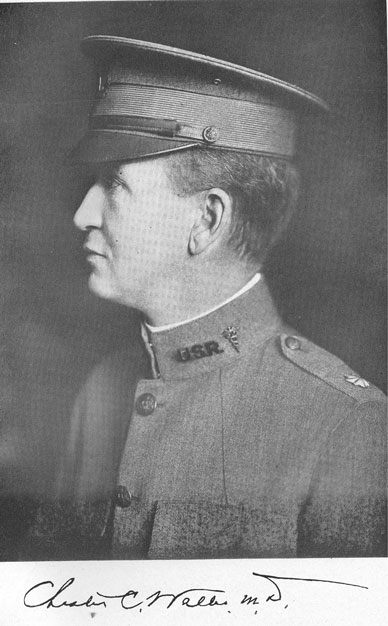
CHESTER CURTIS WALLER, M D. During his residence in the Mahoning Valley the
professional distinctions associated with Chester C. Waller are due almost altogether to his
exceptional abilities and skill as a surgeon. He was in the general practice of medicine for a
number of years before coming to the Mahoning Valley and locating at Warren, where his rare
equipment and talents have earned him special recognition in the difficult field of surgery.
Doctor Waller is a native of Northern Vermont and represents an old American family, his
branch of the family having been pioneers in Northern Vermont. His great-grandfather, Joseph
Waller, presided over the first divine meeting for worship in that section of the state. enry C.
Waller, father of Doctor Waller, was born in Vermont, in early life was a farmer and later was a
merchant at Irasburg, where he died in 1879. e was very active and influential in the Grange.
Henry C. Waller married Josephine Bogue, a native of Northern Vermont. She survived her
husband only four months. er father, Virgil P. Bogue, a Vermont farmer, had a family of three
sons and five daughters, all the sons becoming physicians, while one daughter married a
Physician. The great-uncle of Doctor Wallet of Warren was Dr. R. G. Bogue, who was one of the
early medical men in the City of Chicago. Doctor Waller is one of four sons, being the oldest of
the family. His brother, Henry A., for the past fourteen years has been superintendent of the
Providence and Dandleson Street Railway Company. Halley T. is secretary of the Young Men's
Christian Association at Akron, Ohio, and president of the board of education of that city. Percy
C. is a physician in Vermont.
Dr. C. C. Waller was born at Irasburg, Orleans County, Vermont, March 14, 1872. As a boy he
lived in the rugged environment of a Vermont farm. He attended district schools, also the
Vermont Methodist Seminary at Montpelier, and spent one year in the study of medicine at the
University of Vermont. Another year he was in the medical department of Dartmouth College,
and his third and final year was spent at the Baltimore Medical College, now the medical
department of the University of Maryland. He graduated there with the M. D. degree in 1898.
Doctor Waller spread his medical work among these three schools from conscious intention and
not as a result of circumstance. It was his desire to get the advantages of the methods and come in
touch with the able men of all three institutions.
Doctor Waller practiced for fourteen years in his home town in Vermont. Early in his career he
dis-
YOUNGSTOWN AND THE MAHONING VALLEY - 239
covered a special aptitude for surgery and neglected no opportunity to specialize in that line. For
a number of years he was a regular attendant at the surgical clinics held in Montreal, Canada, a
city only ninety miles from his home town. In 1912 Doctor Waller located at Lyndonville,
Vermont, where he began specializing in surgery. At the same time he was affiliated with the
Brightlook and St. Johnsbury hospitals. After considerable investigation Doctor Waller
determined to locate at Warren, and his home has been in that city since October 1815. From the
first he confined his work largely to surgery. The preceding four years he had given all his spare
time to research study and attendance at the hospitals and clinics.
Doctor Waller was commissioned a captain in the Medical Reserve Corps, May 16, 1917. He
was ordered to active duty the 28th of June and nine days later assigned administrative work.
September 4, 1917, he was assigned to the Seventy-sixth Division at Camp Devens,
Massachusetts, in command of the Regimental Detachment of the Three Hundred and First
Infantry. March 23, 1918, he was commissioned major in the Medical Corps, and on July 6th was
ordered to France with the above organization. September 23, 1918, he was made division
sanitary inspector and assigned to the office of division surgeon. November 5th he was made
acting division surgeon by special order No. 92, paragraph 14, at headquarters of the Third Depot
Division, American Expeditionary Forces, American Post Office No. 773. He was continued in
that capacity until the completion of the transfer of officers and men of the Seventy-sixth
Division, and then, on November 29, 1918, was requested by the chief surgeon of the
intermediate section to take station at Navarre, France, with the Nineteenth Engineers
(Pennsylvania Railway outfit), the purpose of which assignment was to expedite sanitary
measures in the checking of typhoid and diarrhea. diseases that had been defying all efforts to
eradicate since the preceding January. A promise was given him at the time, as a reward, of an
immediate transfer home. This promise materialized December 24, 1918, when he received home
orders. He was honorably discharged at Camp Mills, New York, April 28, 1919, and on the 5th
of June following resumed his work at Warren.
Aside from rendering patriotic service to his country, Doctor Waller looked upon the army
service as an opportunity for valuable surgical experience, but his special genius for
administrative work caused his various assignments as above noted, and, as a matter of fact, lie
handled only a single case of surgery all the time he was in the army, that being aU emergency
appendicitis operation. Since returning from France Doctor Waller has limited his practice to
surgery and diagnosis.
Doctor Waller is a member of the Trumbull County and Ohio State Medical societies and of the
American Medical Association, and is affiliated with Carroll F. Clapp Lodge Free and Accepted
Masons, it Warren, the Warren Lodge, Knights of Pythias, Warren Lodge of Elks, and the
Warren Rotary Club.
Doctor Waller married Grace M. White, daughter of Charles C. and Miranda White, of North
Troy, Vermont. Mrs. Waller died in 1911, the mother of three children : David Wilkie, born rn
1903; Gerald Charles, born in 1907; and Geraldine Rosamond, born in 1908.
In 1913 Doctor Waller married his present wife, who was Emily Waller, a distant relative and a
childhood friend, a woman of rare attributes, who has assumed the maternal care of the doctor's
children.
JOHN MCKENZIE HENDERSON. One of the agencies that has contributed most to the
volume of the automobile business at Warren is the Henderson Motor Car Company, of which
John M. Henderson is general manager and treasurer. Mr. Henderson has been exceptionally
successful in the automobile field, though he came to it from the field of art. For a number of
years he was a well known teacher of music, with a studio at Cleveland.
Mr. Henderson was born at Youngstown, April 21, 1878, son of William and Justina (McKenzie)
Henderson. His parents were born in Scotland, and about a year and a half after their marriage
they came to the United States and located at Youngstown. William Henderson was identified
with the Brown-Bonnell plant at Youngstown as foreman in the puddling department for over
thirty years. He died in March, 1914, at Youngstown, where his wife is still living.
John M. Henderson acquired a public school education at Youngstown. He early evinced special
talents in music and largely by his own efforts acquired a liberal musical education. For eight
years he was a student under some of the best instructors in New York City. His professional
career began in 1907 as director of music at Simpson College, Indianola, Iowa, where in addition
he taught vocal four .years. He then returned to Ohio, establishing a studio in Cleveland, where
he remained five years. During that time he was head of the music department at Hiram College.
Mr. Henderson gave up his profession in 1916 to enter the automobile business. His first location
was at Niles, where he was president of the Henderson Motor Car Company. A year later the
business was removed to Warren. This company now handles and distributes the Overland and
Willys-Knight cars and the Garford trucks, and has rolled up an imposing aggregate of business
for those well known makes.
Mr. Henderson is president of the Trumbull County Automobile Trades Association, is a member
of the Warren Automobile Club and the National Automobile Club. He is also active in the
Warren Board of Trade, the Warren Rotary Club, and is affiliated with Carroll F. Clapp Lodge of
Masons, the Royal Arch Chapter and Warren Lodge of Elks.
Mr. Henderson married Miss Jane Caldwell, daughter of James and Belinda (Connor) Caldwell.
er parents were natives of Ireland. Her father was long a resident of Youngstown and built the
monument in the Square in that city. For that work compensation to him was delayed thirty-five
years. Mr. and Mrs. enderson have three children: Bruce Pauley, Dorothy Virginia and Louise
Caldwell.
240 - YOUNGSTOWN AND THE MAHONING VALLEY
HARRY S. SMITH. One of the successful businessmen and popular citizens of Warren is Harry
S. Smith, who has been closely identified with the affairs of the city for over twenty years, during
which time he has worked his way up from journeyman to owner of one of the leading plumbing
and heating concerns in this part of the Mahoning Valley.
Mr. Smith is a native of this valley, and is in the fourth generation of his family here. His paternal
great-grandfather was one of the earliest settlers of the valley, and his grandfather, William
Smith, was born here. His father, William A. Smith, was born at Petersburg, and is at the present
time engaged in carpentering and cabinet making in Youngstown. His mother, Caroline (Felker)
Smith, daughter of John P. Felker, was born at New Springfield, and died in 1904.
Harry S. was born at New Springfield, Mahoning County, on March 29, 1873. He was educated
in the Youngstown public schools, and in that city he served an apprenticeship at the plumbing
trade with the old firm of Stambaugh & Thompson. After finishing his three years' apprenticeship
he worked for the old firm as journeyman until 1900, in which year he came to Warren and
worked as a journeyman for two years, and in 1902, being ambitious to have a business of his
own, he opened a small shop on West Market Street. He began in a small way with limited
capital, but his skill as a workman and his business and personal qualities were soon recognized,
and his business grew rapidly. In order to obtain quarters to accommodate his increasing
business, he removed to the Masonic Temple Building on East Market and Pine streets, and in
1907 he formed a partnership with the late F. F. Childs, under the firm name of Smith & Childs,
plumbers, and gas-fitters. In 1916, upon the death of Mr. Childs, the entire business was taken
over by Mr. Smith, which by now has grown into one of the largest plumbing and steam-heating
concerns in this section of Ohio, with offices, show rooms and work-rooms at 27 North Pine
Street.
Mr. Smith is active and prominent in his business and has been honored by the trade associations.
He is past president of the Ohio State Association of Master Plumbers, and is president of the
Mahoning Valley Master Plumbers' Association. He is a member of the Warren Builders'
Exchange, of the Warren Board of Trade and of the Warren Rotary Club. He is a member of Old
Erie Lodge No. 3, Free and Accepted Masons, past eminent commander of Warren Commandery
No. 39, Knights Templar, and belongs to Cleveland Consistory (thirty-second degree) Scottish
Rite.
Mr. Smith married Bertha E. Boynton of Youngstown and both of them are members of the First
Methodist Episcopal Church.
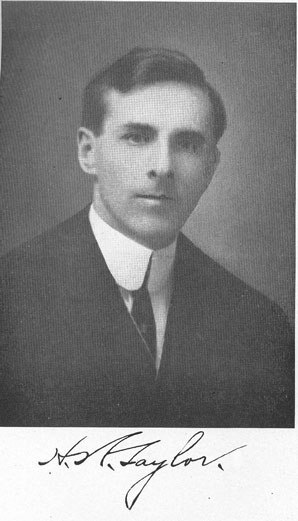
HALSEY WILLARD TAYLOR. The credit and responsibility belong to Mr. Taylor for giving
Warren one of its most prosperous and distinctive industries, the extensive plant which today
manufactures many types of drinking fountains, known generally to the trade as the Puritan
Fountains, all made from the designs and under the patents owned and controlled by Mr. Taylor.
Mr. Taylor has spent most of his life in this section of Ohio. He was born at Pickering, Missouri,
February 18, 1877, and was about one year old when his parents, Alfred C. and Josephine L.
(Sturgill) Taylor, came to Ohio and settled at Leavittsburg in Trumbull County. His father was a
native of New York State and his mother of Missouri. The family lived at Leavittsburg about
sixteen years, Alfred 'Taylor being local agent of the Erie Railroad. He was one of thousands
attracted to the opening of the Cherokee strip in Oklahoma Territory in 1892, and his family
followed him to the west. Alfred Taylor died there in 1893, and the widowed mother and her
children then returned to Leavittsburg. In the spring of 1893 they moved to Warren.
Halsey W. Taylor acquired his education in the public schools of Leavittsburg. At the age of
fourteen he found an opening for work in the foundry of the Neracher Sprinkler Works at
Warren, now known as the Grinnell Company. Every night and morning he walked back and
forth from his home in Leavittsburg to the plant, but later found work nearer home at the Erie
Railway transfer at Leavittsburg. Then after the western experience of the family and their return
to Warren, Mr. Taylor found employment for six years in the old Warren Stove Works, which
plant, doubled in floor space, Mr. Taylor recently bought and it is now the home of his own
company. On leaving the Warren Stove Works he became an employe of the Packard Electric
Works, and was with that industry for sixteen years, thirteen years of that time as shop
superintendent.
In the meantime Mr. Taylor had been exercising his inventive genius by working out some ideas
and plans of his own. With N. A. Wolcott of the Packard Electric Company, and Evan J.
Thomas, he completed the organization of the Halsey W. Taylor Company in September, 1913,
Mr. Thomas withdrawing shortly afterward. This company was founded for the purpose of
manufacturing a patented drinking fountain designed by Mr. Taylor. On November 1, 1919, Mr.
Taylor acquired Mr. Wolcott's interest and is now sole owner of the business. e manufactures the
Puritan drinking fountain under his own invention and patents, and has made several of the most
valuable improvements in sanitary drinking fountains. During the World war he was the only
manufacturer who succeeded in meeting the exacting requirements of the Government for a
sanitary drinking fountain to be used in the Government cantonments and naval training stations.
His fountain was adopted over many competitors, and fountains manufactured in his plant at
Warren were used in the various cantonments, naval training stations and aviation camps in
France.
This business has been one of steady growth and development. At the beginning only one type of
fountain was manufactured, but at the present time the output consists of from thirty to forty
sizes, forms and types, all of them designed by Mr. Taylor. He now has contracts with some of
the chief interests in the country requiring this product. There has been a proportionate increase
in the plant at Warren. until now it utilizes 34,000 square feet of floor space, with fifty skilled
laborers in the plant, and today this company is the largest exclusive manufacturer of sanitary
drinking equipment in the world.
YOUNGSTOWN AND THE MAHONING VALLEY - 241
Mr. Taylor is a member of the Warren Rotary Club, the Board of Trade, Benevolent and
Protective Order of Elks and the Country Club. He and his family are members of the First
Baptist Church. e married Miss Laura J. McComb, of Warren, daughter of William C. and
Elizabeth (McGregor) McComb. They have four children, Halsey Willard, Jr., Laura Evelyn,
Velva Effie and Ann Eleanor.
WALLACE ANDREW LYNN. The strong and efficient administration of municipal affairs
under the present able regime of Mayor McBride has brought general satisfaction to the people of
Warren. One of the able members of the mayor's cabinet is the director of safety, Wallace
Andrew Lynn.
Mr. Lynn has spent most of his life in Warren, and has always shown much capability in
everything he has undertaken. He was born in Warren Township, about five miles from the city,
on May 18, 1877, son of George F. and Mary (Kibler) Lynn. His father was born in Cornersburg,
Mahoning County, and when a boy his father, Peter Lynn, moved to Warren Township. Mary
Kibler was born in Warren Township south of Leavittsburg. er father, George Kibler, was a
native of Germany and at the age of fourteen came with his parents on a sailing vessel, and after
a 142 day's on the water landed in this country and subsequently established a home in Trumbull
County. George F. Lynn and wife, are still living on the home farm, the former in his sixty-sixth
year and the latter at the age of sixty-nine.
Wallace Andrew Lynn grew up on a farm, was educated in district schools, and at the age of
eighteen left home and came to Warren. He learned the trade of blacksmithing with the firm of
Klippel & McCrackin. After three years at Warren he established a shop of his own at Rosemont
in Mahoning County, remained there three years, and then returning to Warren bought the shop
where he had learned his trade. He has since developed a profitable and extensive business, both
in general blacksmithing and in horseshoeing.
Mr. Lynn is a member of Old Erie Lodge No. 3, Free and Accepted Masons, Trumbull Lodge No.
186 of the Moose and the American Insurance Union. He is a member of the Masonic Club. e
assumed his duties as director of safety for the City of Warren on January I, 1920.
Mr. Lynn and family are members of the First Reformed Church. He married Alice Toot, who
was born at Lordstown, daughter of John and Mary (Bailey) Toot. Mr. and Mrs. Lynn have four
children : Harold, who was born in 'goo and is now in the employ of the Second National Bank at
Warren; Gertrude, born in 19o4; Kenneth, born in 1907; and Mildred, born in 1915.
GEORGE TAYLER HECKLINGER began his fourth successive term as city auditor of
Warren on January I, 1920. Besides these official duties he is now and has for a number of years
been one of the well qualified lawyers of Trumbull County. He has found the rewards of his
profession in the same locality where he has spent his life and where his family have lived for
many years.
Mr. Hecklinger was born at Warren, February 1, 1875, son of Martin and Adaline (Tayler)
Hecklinger, His grandfather, Martin Hecklinger, brought his family to the United States in 1856,
locating first in Youngstown and later in Warren, where he was a merchant. Martin Hecklinger,
Jr., was born in France in 1848 and was about eight years of age when he came to Ohio. For
many years he was an active factor in the manufacturing and industrial life of Warren, but has
lived retired since 1918. e and his wife are highly respected citizens of Warren. Adaline Tayler
was born at Warren in 1851. er father, Matthew B. Tayler, was for many years cashier of the old
First National Bank of Warren.
George Tayler ecklinger was reared in Warren, attended the public schools and graduated in 19o4
from Mercersburg College in Pennsylvania. He read law with his uncle, J. J. Sullivan, now of
Cleveland, then of Warren, and was also a law student in the University of Pennsylvania,
graduating and receiving his LL, B. degree in 1906. e was admitted to the bar that year and was
soon busy with a growing practice in his native city. Mr. Hecklinger was first elected city auditor
in 1914, and has been chosen his own successor three times.
He does his part as a good citizen, is a member of the Warren Board of Trade, and affiliated with
Old Erie Lodge No. 3, Ancient Free and Accepted Masons, Warren Chapter No. 66, Royal Arch
Masons, Mahoning Lodge No. 69 of the Independent Order of Odd Fellows, and Warren Lodge
No. 295 of the Elks. He is also a member of the First Methodist Episcopal Church. January 24,
1900, Mr. Hecklinger married Miss Cathryne Vogeley. Her father, William Vogeley, is a member
of the Vogeley Oil Company of Pittsburg.
MYRON SEATON CURTIS was born at Washington, District of Columbia, October 29, 1888,
a lineal descendant of the old Curtis family of Scituate, Massachusetts. His grandfather, Charles
T. Curtis, was a civil engineer, and during the Civil war had charge of the construction of Cabin
John's Bridge, the historic aqueduct erected by the government near Washington, which was at
that time the longest single-span stone bridge in the world. His parents are William T. S. Curtis
and Mary (Barnard) Curtis, residing at Chevy Chase, Maryland.
Mr. Curtis was educated at George Washington University as a chemical engineer and came to
Youngstown in 1911. He entered the works of the Youngstown Sheet & Tube Company, and has
been connected with that company since that time, being now special agent. He was married in
November, 1913, to Nellie, daughter of John R. and Etta (Bowman) Squire, of Youngstown, and
resides at 278 Redondo Road, Youngstown.
Mr. Curtis is a member of the American Iron & Steel Institute, the American Society for Testing
Materials, the Youngstown Club, the Youngstown Country Club and the First Presbyterian
Church.
WILLIAM FLETCHER EDWARDS, one of the leading business men of Warren, has been
identified with the manufacturing interests of the city since 1893. He has on many occasions
during these years demon-
242 - YOUNGSTOWN AND THE MAHONING VALLEY
strated his readiness to cooperate with and support any project that seemed to him to promise
good for some phase of the affairs of the city, and by his public spirit and his industrial effort has
had an important part in the progress of Warren during the last generation.
He was born at Niles, Trumbull County, Ohio, July 6, 1873, the son of John F. and Nancy
(Martin) Edwards, and grandson of Samuel Edwards, who was one of the pioneers of the
Mahoning Valley. The Edwards family is of British origin, but has had residence in America for
many generations. Early the family appears to have been in Virginia, but Benjamin Edwards,
great-great-grandfather of William F., lived in Butler County of the State of Pennsylvania, and
there his son John was born. Samuel, son of John, was also born in Butler County, Pennsylvania,
the year of his birth being 1812. He was quite a young man when he came into Ohio and settled
in the Mahoning Valley at Niles, Trumbull County. He endured the privations that fell to the lot
of the average pioneer, and he was evidently a man of strong purpose, for whatever hardships
came to him he met and overcame them, or the family has had connection with Niles since he
first settled there. John F. Edwards, his son, and the father of William F., was born in the family
homestead at Niles. He was for many years employed in the iron mills at Niles, and when he
retired from business in 1892 he removed to Warren, where he lived for the remainder of his life,
which ended in 1900. He married Nancy Martin, daughter of Benjamin Martin, a Kentucky
planter. She was born in Lexington, Kentucky, and died in 1905, in Warren, Ohio, although for
the greater part of her life she had lived in Niles, Trumbull County, Ohio.
William Edwards, son of John F. and Nancy (Martin) Edwards, spent his early life in his home
town, attending the public schools of Niles. His first employment was in the clothing store of J.
L. Hudson, Detroit. In the same year, however, he became an employe of the Detroit Steel and
Spring Company, working in the Detroit plant of the company. For several years he was
employed in the Old Mill at Niles, Ohio, and with the Reeves Brothers Boiler Works in that city.
In 1893 he came to Warren with Mr. A. R. Hughes and Benjamin W. Edwards, his younger
brother, the three in that year organizing and establishing in Warren a manufacturing plant which
is now known as the Warren City Tank and Boiler Company. In 1908 the business had reached
such dimensions that with a view to further rapid expansion corporate powers were secured, and
as an incorporated concern the enterprise took the name of the Warren City Tank and Boiler
Company, of which Mr. William F. Edwards is vice president. He has taken active part in the
management of the company since its inception, and much of its present standing among
American boiler plants is due to the business ability of Mr. Edwards.
He is a member of all Masonic bodies, belonging to Old Erie Lodge No. 3, Free and Accepted
Masons, to Warren Commandery No. 39, Knights Templar, to Lake Erie Consistory,
thirty-second degree Scottish Rite, and to Al Koran Temple of the Mystic Shrine. He also is
affiliated with the War ren Lodge of Elks. Socially he is a member of the County Club,
Cleveland Athletic Club, Old Colony Club, which last named organization maintains quarters in
leading hotels of large cities expressly for the accommodation and comfort of its members who
might be visiting in those cities.
Mr. Edwards married Meda, daughter of Noah Vest, of Missouri. The late distinguished United
States Senator Vest of Missouri was a member of the family to which Mrs. Edwards belongs. To
Mr. and Mrs. Edwards have been born three children: Helen J., born May I, 1903; Harold W.,
born December 20, 1904; Arthur M., born December 19, 1905.
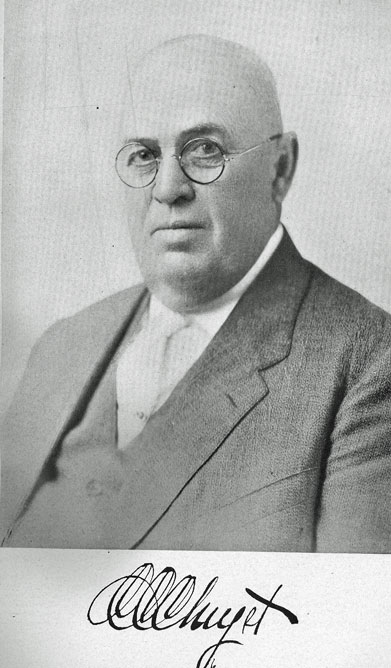
CHARLES C CHRYST. If Charles C. Chryst had never accomplished anything more than the
carrying out of his successful campaign in favor of good roads in Trumbull County his name
would be enshrined among the worth-while citizens of the Mahoning Valley. He has always been
an enthusiast on this subject, to which he has given thorough and practical attention, and has
managed to communicate some of this enthusiasm to his fellow citizens with very gratifying
results, as those passing over the fine roads constructed under his administration as road
commissioner testify upon all occasions.
Charles C. Chryst was born on the old Chryst homestead in Weathersfield Township, Trumbull
County, on September 12, 1856, and is descended from one of the old and prominent families of
the Mahoning Valley. Solomon R. Chryst, his father, was born at Lordstown, Trumbull County,
in 1833. a son of Jacob Chryst. Jacob Chryst was born in the vicinity of Philadelphia,
Pennsylvania, a son of the original American ancestor who came here from Germany at the close
of the eighteenth century and settled in Pennsylvania. Leaving the Keystone State, Jacob Chryst
came to the Mahoning Valley sometime between 1817 and 1820, settling rn Lordstown
Township when that section was a forest. He bought considerable land, became a successful
farmer, and lived to reach his eighty-eighth year.
Solomon Chryst moved into Weathersfield Township, where he was engaged in farming and the
buying and selling of stock for many years, becoming known all over Trumbull County as a man
of irreproachable character and as a worthy citizen. Later on in life he moved to Warren and
lived there in retirement until, his death in 1909. He married Elizabeth Johnson, who was born on
the Johnson farm in Duck Creek neighborhood, and died at Warren in 1880. Her parents came to
Trumbull County from Connecticut.
Charles C. Chryst on the old homestead and was educated at the public schools, Hiram College
and Allegheny College at Meadsville, Pennsylvania, leaving the latter institution, however,
before he was graduated so as to take advantage of a good business opening. In 1874 he engaged
in a grocery and provision business at Warren, and continued it until 1879, when he returned to
the farm and was associated with his father in the stock business until he was thirty- five years of
age. In 1888 he re-entered the gro-
YOUNGSTOWN AND THE MAHONING VALLEY - 243
cery and provision business at Warren, expanding it into a public market, which he sold at a good
figure in September, 1918. In 1893 Mr. Chryst became interested in the hotel business at Warren
as senior member of the firm of Chryst & Roach, they taking over the Park Hotel at that time. In
1910 they became the owners of the Colonial Hotel and have since then operated both properties,
which are the two leading hostelries of Warren. In the same year that they secured their second
hotel, these partners organized the Warren Provision Company which was incorporated with Mr.
Chryst as president, but this company went out of business in 1918.
Mr. Chryst is regarded, and justly so, as the "father of the good roads" in Northeastern Ohio, as it
is due to his efficient efforts that the present system of macadam roads was inaugurated in
Trumbull County, where the first roads of that kind in this part of Ohio were built. The beginning
of this era had its inception in the plan of Mr. Chryst to provide some kind of a path along the
public highways for the use of the bicyclists. In 1903 he was appointed by the board of county
commissioners a member of the first board of highway commissioners under the new highway
laws which went into effect that year. Entering enthusiastically into the project Mr. Chryst gave
generously of his time, money and influence and accomplished great things, so that at the
expiration of his four years the county commissioners declined to let him withdraw as highway
commissioner, and he served an additional two years, or until he positively refused further
appointment. During his administration there were built in Trumbull County 250 miles of bicycle
path and fifty-eight miles of macadam roads, a record not easily forgotten.
Mr. Chryst is a man of large and varied affairs, and among other things is a member of the board
of directors of the Western Reserve National Bank of Warren, and was one of the original
members and first directors of the Warren Board of Trade. Mr. Chryst was married to Elizabeth
Qualey, who was born at Elmira, New York, a daughter of Simon and Mary Qualey, both of
whom died at Warren, where they had lived for many years.
Aside from what he has done in the matter of good road building, and in providing Warren with
up-to-date hotel accommodations, Mr. Chryst has accomplished much for the community. He has
upheld the Board of Trade in all of its plans for the development of the city, freely giving of his
time and means to consummate all movements for the general welfare.
Broad-minded and progressive, genial and warmhearted Mr. Chryst holds the friendship of his
business and social acquaintances, while his many traits of character make of him an ideal friend
and citizen. He is of a rugged nature, firm in his opinions, which, though sometimes may be
wrong, he always frankly states when occasion requires, and his viewpoint is always received
with respect, for the very reason that all who know him realize that he is conscientious in his
views and beliefs. He has the courage of his convictions, but is not an opinionated or obstinate
man, and is always ready to concede sincerity to the opinions of others.
RALPH RAYMOND SPEAK recorder of Trumbull County, was born at Cleveland, Ohio, on
January 25, 1891, a son of John R. and Jennie (Moreland) Speak, the former of whom was born
in Scotland in 1853, a son of John Speak, also a native of Scotland. The mother of Ralph R.
Speak was also born in Scotland, the year of her nativity being 1861. The parents were married in
Scotland and came to the United States shortly after their marriage, locating at Cleveland, Ohio.
John R. Speak was chief engineer of trans-Atlantic ships, sailing all of the seven seas, but after
his arrival at Cleveland he followed the machinist trade until 1903. In that year he moved to
Warren, and in 1906 to Niles, where his death occurred on April 30, 1917. His wife died at
Cleveland in 1897.
The early days of Ralph R. Speak were spent at Cleveland and Niles, and he was educated in the
public schools of these two cities, later taking up a general business course in a school of
correspondence. He began his business career when he was a boy of thirteen years with the
Sterling Electric Company of Warren, where he was office boy for one year. e then went to East
Mecca, Ohio, and attended school, working for his board and clothes. Then he returned to the
Sterling Electric Company of Warren, but lived at Niles, and rose to be final inspector with that
company when he resigned to go to the Glass Works at Niles in a clerical capacity. He remained
with that concern until he left on September I, 1917, to assume the duties of county recorder, to
which office he had been elected in November, 1916. He was re-elected to the same office in
November, 1918 and was re-nominated in 1920 without opposition in the primaries. Mr. Speak is
a member of Warren Benevolent and Protective Order of. Elks No. 295, of which he was exalted
ruler in 1919. e is a member of the Buckeye Club of Warren, the Loyal Order of Moose of Niles,
and the Niles Chamber of Commerce, and is one of the energetic young business men of both
Warren and Niles. He is a member of First Christian Church of Niles.
JUDGE DAHL BUCHANAN COOPER, Of Struthers, Ohio, was born September 19, 1880, in
Coitsville, Mahoning County, Ohio, which was likewise the birthplace of his father the late
David Perry Cooper. His grandfather, Robert Cooper, was of English descent, his father having
come from England to the United States with his family, locating first in Maryland, and from
there migrating to Coitsville, Ohio.
David P. Cooper spent the earlier years of his life in Coitsville, where he followed the trade of a
blacksmith and wagon maker. Moving later to Struthers, he established a carriage gear-wood
manufactory, which he managed successfully until his death, which occurred in 1909, at Saint
Louis, Missouri, having been caused by a street car accident. e was then in the prime of life,
having been but fifty-three years of age. e married Mary A. McClelland, a daughter of Capt.
David McClelland, who, serving as an officer during the Civil war, lost his life on the Stone
River battlefield. Both he and his wife united with the Presbyterian Church when young, and she
is still a
244 - YOUNGSTOWN AND THE MAHONING VALLEY
faithful and active member. Fraternally he .belonged to the Independent Order of Odd Fellows,
and politically he was an independent democrat, seeking like his son, the judge, better things
rather than a stringent alignment to party lines. Four children were born of the union of Mr. and
Mrs. David P. Cooper, as follows: Dahl B., with whom this brief sketch is chiefly concerned;
Ralph M., of Struthers, is with the Republic Iron & Steel Company; Mary, who became the wife
of Hugh Hamilton, passed to the life beyond in 1911 ; and David P., Jr., who died in 1904, aged
six years. The mother born in 1858, resides at 263 Poland Avenue, Struthers, Ohio.
Acquiring his elementary education in the public schools of Coitsville and Struthers, Dahl B.
Cooper was graduated from the Rayen High School with the class of 1899. Continuing his
studies in Ohio, he took a full course at Oberlin College, receiving his diploma in 1903. Going
then to Cambridge, Massachusetts, he entered the law department of Harvard University, from
which he was graduated in 1907. Being admitted to the Ohio Bar, he immediately began the
practice of his profession in Youngstown, being associated in partnership with J. F. Williams, Jr.,
with whom he was associated until his election to the judgeship. In 1918 Mr. Cooper was elected
on a non-partisan contest to his present position as judge of the Court of Common Pleas for a
term of six years, and is performing the duties of his office to the entire satisfaction of all
concerned.
Judge Cooper married, August 5, 1915, Ruth G. Creed, a farmer and dairyman at Struthers, and
they are the parents of two bright, interesting children, Betty Louise and William Perry. The
Judge and Mrs. Cooper are worthy members of the United Presbyterian Church. Fraternally the
judge belongs to the Knights of Pythias. From 1909 until the election of 1918 Judge Cooper was
manager of all the dry campaigns in Mahoning County.
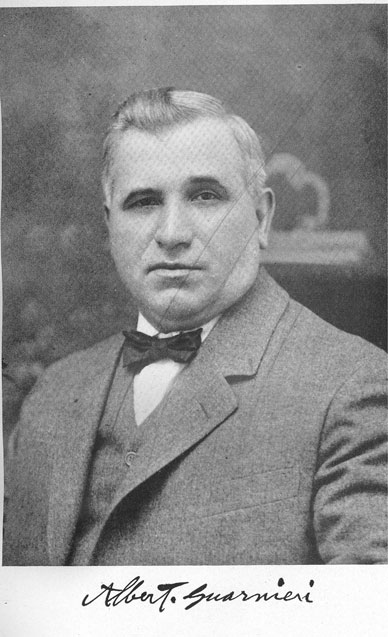
ALBERT GUARNIERI has been a resident of Warren over thirty years. e is one of the most
prominent and successful men in Trumbull County of Italian birth and parentage. He retired from
his active responsibilities as a merchant recently, and for a number of years past has used his
resources for the buying and development of many valuable parcels of real estate in Warren.
Mr. Guarnieri was born at Neirone, near Genoa, January 1, 1866, son of Salvatore Guarnieri. In
1887 he crossed the ocean to New York City and came directly to Warren, where his brothers
John and Paul were in business. John Guarnieri is now deceased and Paul is a resident of
Ashtabula, Ohio. Albert's first employment was with his brother John, who then operated a fruit
stand at the corner of Market and Main streets. After two years, having been able to accumulate a
modest capital, he established a fruit stand of his own at the corner of Market Street and Park
Avenue. The next important advance in his business progress came in May, 1896, when he
opened a confectionery store at 33 East Market Street, also continuing his fruit stand for a time.
He built up a large confectionery business, eventually making it both wholesale and retail, and it
was at his place of business that he could be found almost daily until September, 1919. when he
turned over the confectionery establishment to his son, Albert, Jr., and his daughter, Mrs. Louise
and her husband, Joseph Scarnecchia.
Mr. Guarnieri accepted this relief from his long continued business activity as an opportunity for
a well-deserved rest. He returned to the old home in Italy in the fall of 1919, and remained until
the spring of 1921.
Mr. Guarnieri has always regarded his citizenship in America as permanent, and has invested the
great bulk of his resources in Warren real estate. His first land purchase in the city was the
property at 13 South Pine Street. Later he bought the corner property at 15 South Pine, and
established his home there. In 1908 he bought the Gunglefinger home at 305 East Market Street,
and that has been the Guarnieri residence for the past twelve years. His first acquisition of
business property was 19 South Park Avenue, a lot upon which he erected in 1917 a business
block known as the Basso Block, named in honor of his wife. Following this he acquired at 18
South Main Street another business block, and in association with the well-known Warren real
estate man, James P. Garghill, he acquired the old Russell Hotel at the corner of Main and South
streets. Mr. Garghill later sold his interests to Arthur Lamberti of Youngstown, a cousin of Mr.
Guarnieri. Mr. Guarnieri bought at 126-128 East Market Street the site of the old William Ritezel
home, and erected there a very substantial three-story terra cotta brick block, known as the
Guarnieri Block. The building is so constructed that additional floors may be added. The first
floor of the building as it stands is occupied by a large furniture store, the second by offices,
while the third is divided into apartments. Mr. Guarnieri owned a lot with 70-foot frontage on
Main Street in the City of Niles, but sold this property at a sacrifice in order to promote the
building of the William McKinley birthplace memorial, which occupies part of the lot. Mr.
Guarnieri and Arthur Lamberti bought the old Stanford residence property on East Market Street,
and leaving the residence intact, improved part of the ground with two temporary storerooms.
Another purchase of these two associates 'is the Gilmore home on East Market Street, ground on
which they plan the erection of another business block. Mr. Guarnieri erected in 1919 business
blocks on South Park and South Pine streets, and he is individually the owner of at least fifteen
residence properties in Warren. In his real estate operations Mr. Guarnieri may be said to be a
good buyer and poor seller, since he still holds title to all the property he has acquired at different
times, being attracted rather by stable investments than by possibilities of speculation.
Mr. Guarnieri is also a stockholder in the Columbian Fire Insurance Company of Detroit, and the
Jamestown, New York, Telephone Company. He is a Knight of Columbus and with his family a
member of St. Mary's Catholic Church. Mr. Guarnieri married Mary Basso, who was born in the
same village as her husband and came to this country in 1885, joining relatives at Cleveland, in
which city Mr. and Mrs. Guarnieri were married.
Their son, Lewis Lawrence Guarnieri, is one of
YOUNGSTOWN AND THE MAHONING VALLEY - 245
the prominent young members of the Trumbull County bar. e was born at Warren July To, 1896,
graduated from the Warren High School in 1914, and from the law department of the Catholic
Unversity of America at Washington in 1918 with the degree LL. B. He also received two
degrees, Master of Laws and Master of Patent Laws, from the Georgetown Law School of the
District of Columbia. He passed the bar examinations in June, 1919, and in July of the same year
was admitted to the Ohio bar and began practice at Warren. He is a member of the Trumbull
County Bar Association, the Board of Trade, St. Maryls Parish and the Knights of Columbus. He
is also affiliated with two college fraternities, Epsilon Lambda and Sigma Chi, • and is active in
the membership of Warren Lodge No. 295, Benevolent and Protective Order of Elks.
THEODORE J. ARTER, who has charge of the Standard Oil interests at Youngstown, is a
member of a family which for three successive generations has been continuously identified with
some phases of oil production in Ohio and Western Pennsylvania.
Mr. Arter, who has been the Standard Oil representative at Youngstown since 1909, was born in
Columbiana County, Ohio, in 1867, son of Theodore and Susan (Pritchard) Arter, and grandson
of David Arter. David Arter, of Columbiana County, owned several profitable oil properties in
the early days. e was a native of Ohio. Theodore Arter went to Cleveland in 1869, and was
associated with that group of interests at Cleveland which now comprise the Standard Oil
Company. For many years he was in the cooperage department, and had much of the
responsibility of a large and growing industry devoted to the making of barrels and tanks for the
storage and conveyance of oil.
Theodore J. Arter attended the Central High School at Cleveland and at the age of eighteen
entered the service of the Standard Oil Company. For a time he had charge of the shipping
department of the refinery at Cleveland. The corporation's business at Youngstown, of which he
has had responsible charge for the past ten years, comprises a large and extensive plant, which
was first established on the Erie Railroad between Champion and Walnut streets, but in 1914 was
moved to the Pennsylvania tracks at Poland Avenue. Four acres of ground are devoted to the
storage tanks, equipment and office buildings and warehouses.
Mr. Arter is a member of the First Presbyterian Church, is a Royal Arch Mason and Elk, and a
member of the Rotary and Youngstown clubs. In 1893 he married Miss Gertrude Phelps, of
Kingsville, Ohio. They have three children: Capt. Theodore Arter, Jr., Jean B. and Adelbert. The
son Captain Theodore received his commission in an officers' training camp, was in the aviation
department, and for a time was commander of the Langley Field in Virginia.
WELLS L. GRISWOLD. There are some individuals who always seem to have the inclination
and find the opportunity to attend to good works whether of a public or private nature. Wells L.
Griswold, trust officer of the Dollar Savings and Trust Company, is pre-eminently of this class.
He belongs to the group of able citizens whose civic interest is equal to their business enterprise,
and who are devoting their energy to the advancement of municipal affairs. A man of broad
education and fine, sympathetic nature, he is admirably fitted to be identified with the
progressive guard of such a city as Youngstown.
Mr. Griswold is a native of Ohio, having been born in Ashtabula County, August 13, 1868, one
of three children of Henry F. and Susanna (Laird) Griswold. The Griswolds have been in this
country since 1629, and farming, the principal occupation of its members, occupied the attention
and energies of Henry F. Griswold. Wells L. Griswold was reared in an agricultural atmosphere
on the home farm, and in his boyhood attended the district schools for the rudiments of his
education. Later he went to New Lyme Institute at South New Lyme, Ohio, where he completed
the course under Dr. Jacob Tuckerman, subsequently matriculating at Oberlin College, from
which he was graduated with the degree of Bachelor of Philosophy in 1894, and received his
master's degree later. During this scholastic career he taught school, thus helping to defray the
expenses of his education. For seven years following his graduation from Oberlin he was
superintendent of schools at Collinwood, Ohio, now a part of Cleveland, and in 1901; came to
Youngstown, where for ten years he was principal of the Rayen School. In 1911 he became trust
officer of the Dollar Savings and Trust Company, and this position he has since filled.
Mr. Griswold has been prominently identified with many important movements. For some time
he has been treasurer of the Mahoning Chapter of the American Red Cross, and during the period
of the great war held a like position with the Mahoning War Chest, to which was subscribed
$2,165,000. He was treasurer, also, of the Youngstown Base Hospital Fund, and chairman of all
five of the Mahoning County (including Youngstown) Liberty Loan campaigns. His record is that
of a useful, patriotic and public-spirited citizen who has contributed generously of his abilities
and energies to those things which have assisted in developing higher education, better morals
and public-spirited citizenship.
Mr. Griswold was married July 3, 1895, to Miss Louise Fitch, of Hastings, Minnesota, and they
have three children: Francis F., Katharine L. and Alice Louise. Mr. and Mrs. Griswold belong to
the First Presbyterian Church of Youngstown, of which he has for years been an elder. He is a
member of the Youngstown Club, the Youngstown Country Club and the Youngstown Chamber
of Commerce.
ABRAHAM KAMENETZKY. A fine representative of the enterprising and energetic young
men who come from a foreign land to this country of great opportunities, Abraham Kamenetzky
has already obtained a secure position among the prosperous merchants of Youngstown, and as
an active member of the R. & K. Specialty Company is ably assisting in advancing the mercantile
interests of the city. A native of Russia, he was born August 15, 1885, in Lithuania, where the
days of his boyhood and youth were spent. His parents, David and Ida Kamenetzky, immigrated
246 - YOUNGSTOWN AND THE MAHONING VALLEY
from Lithuania to the United States in 1901, locating in Cleveland, where both are still living, the
father being successfully engaged in the hardware business.
Brought up and educated in his native land, Abraham Kamenetzky, following in the footsteps of
his parents, came to Ohio in 1904, arriving in Cleveland on August 14th. A short time later he
entered the employ of I. Shapiro & Sons, wholesale dealers in house furnishings, and .remained
with that firm as clerk and salesman forl a number of seasons. Coming to Youngstown in 1911,
he established the Youngstown Notion & Specialty Company, which he managed alone for two
months. Entering into partnership in 1912 with Louis Regenstreich, he organized the R. & K.
Specialty Company, which has been exceedingly prosperous, its trade being extensive and
constantly increasing in volume and in value.
Mr. Kamenetzky married, in December, 1912, Hattie J. Halper, of Cleveland.
|
